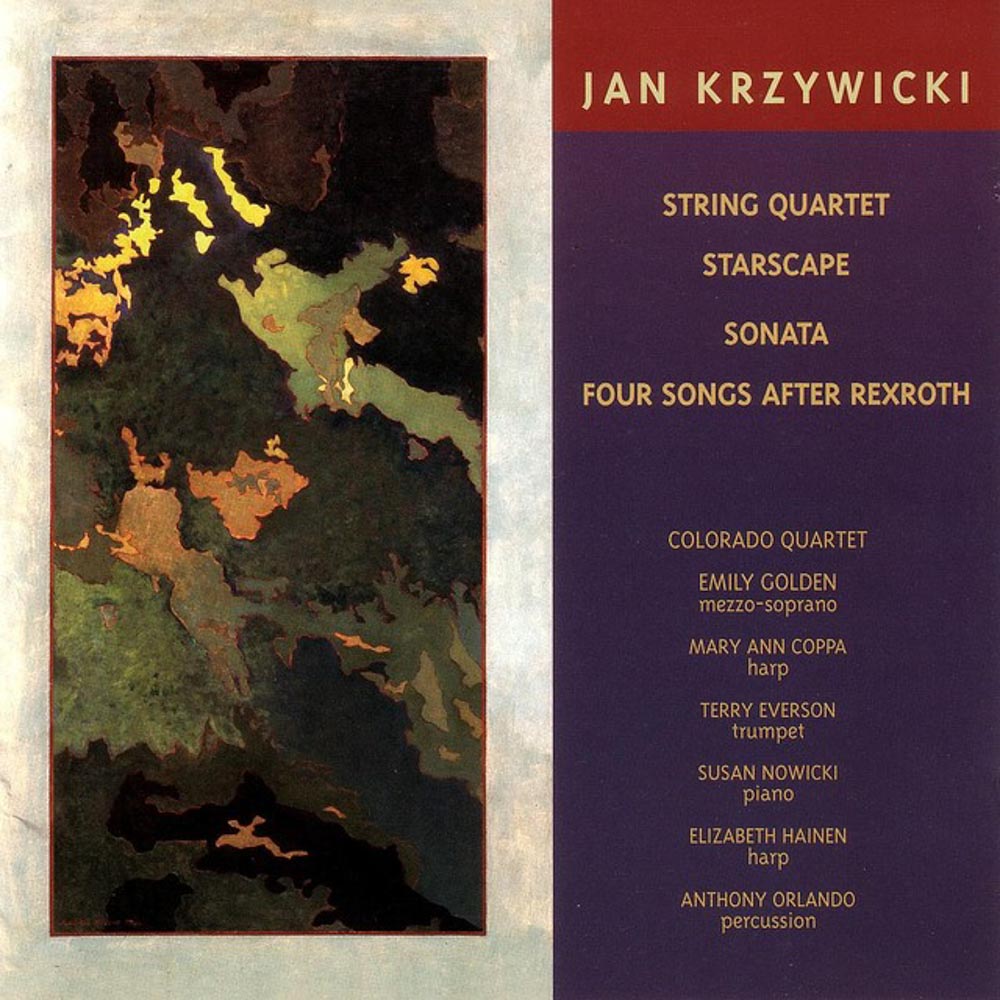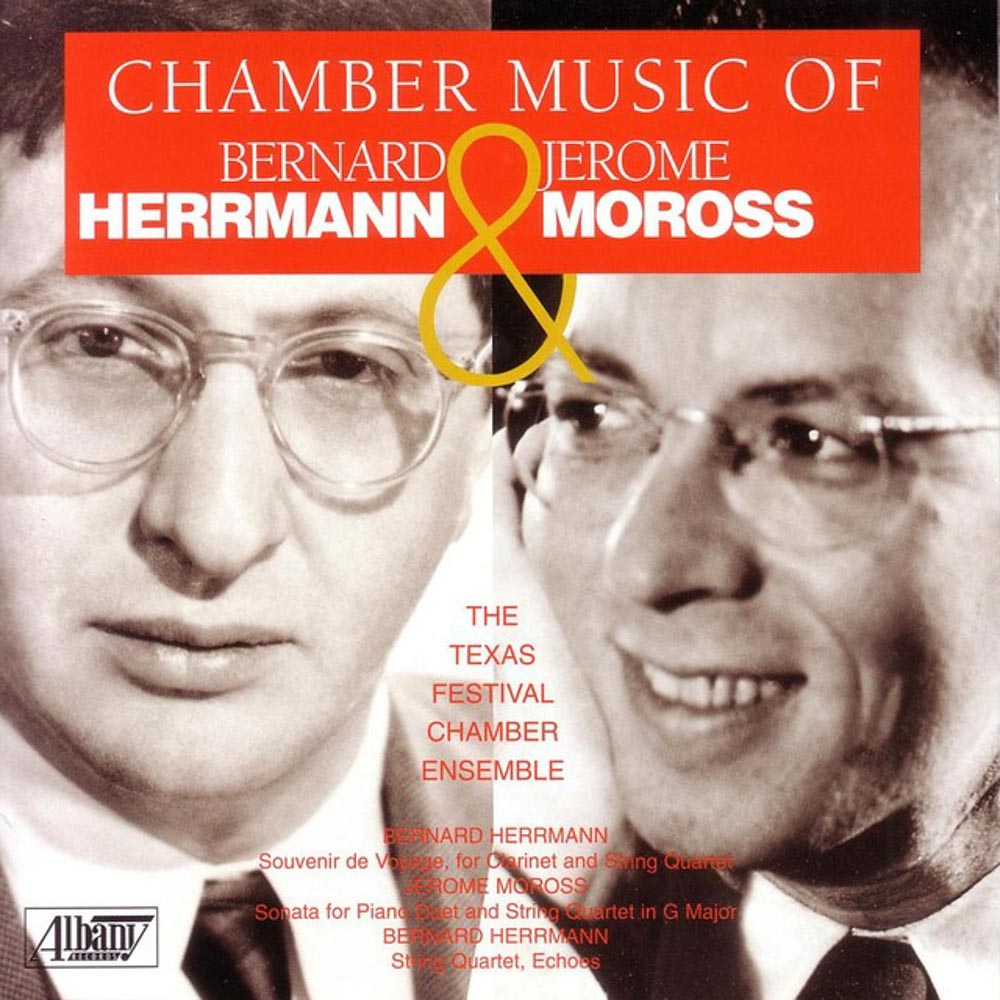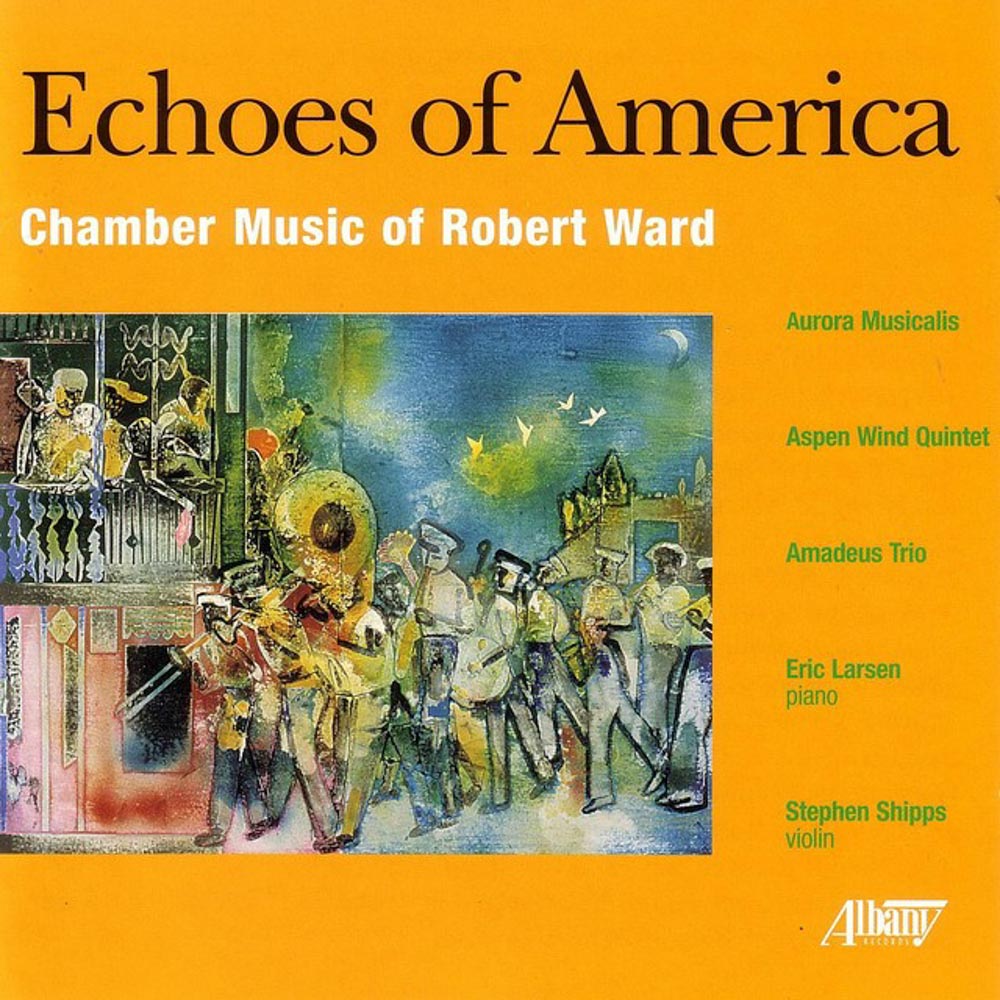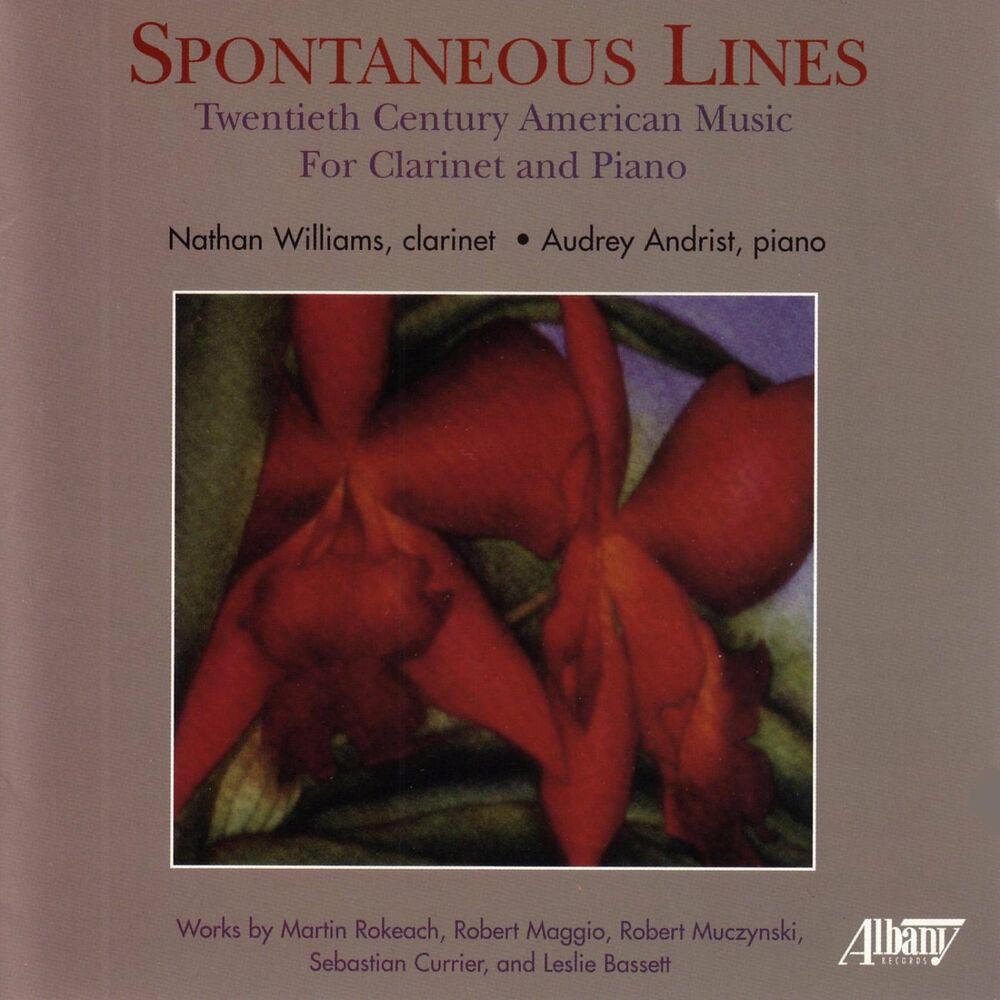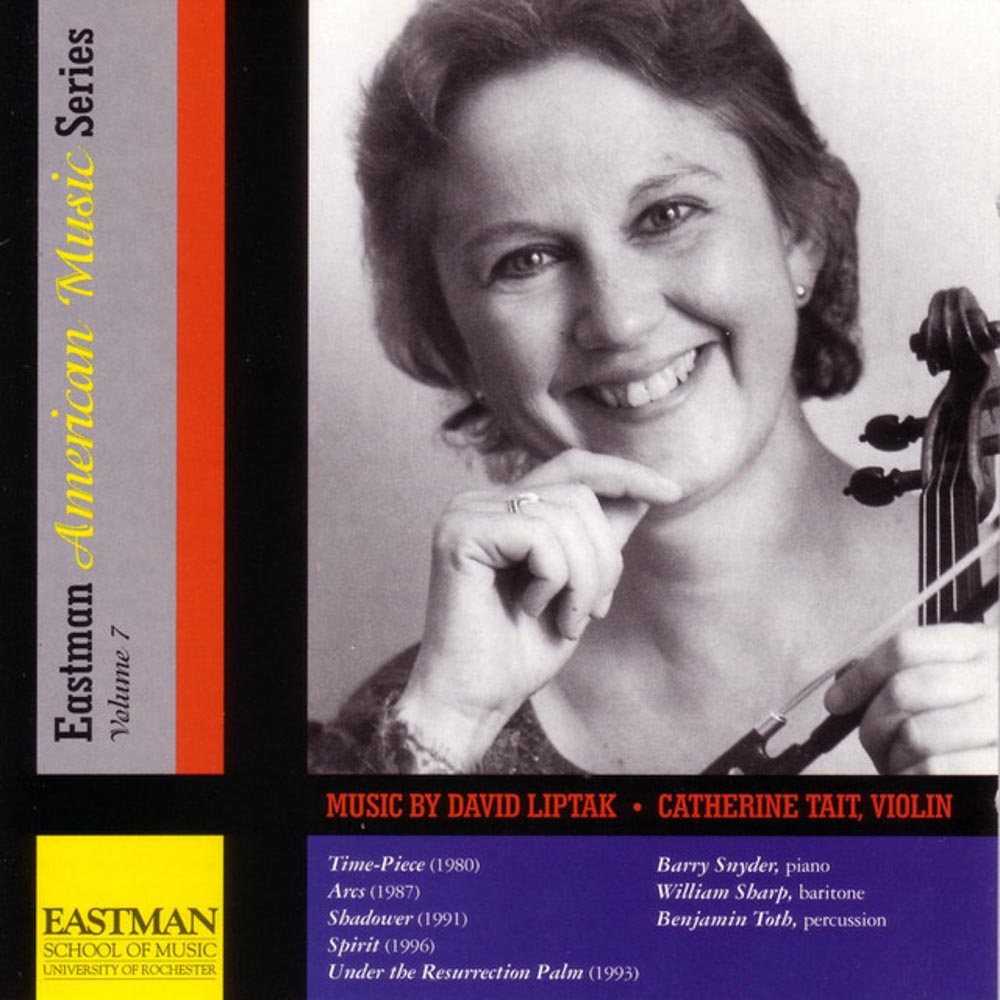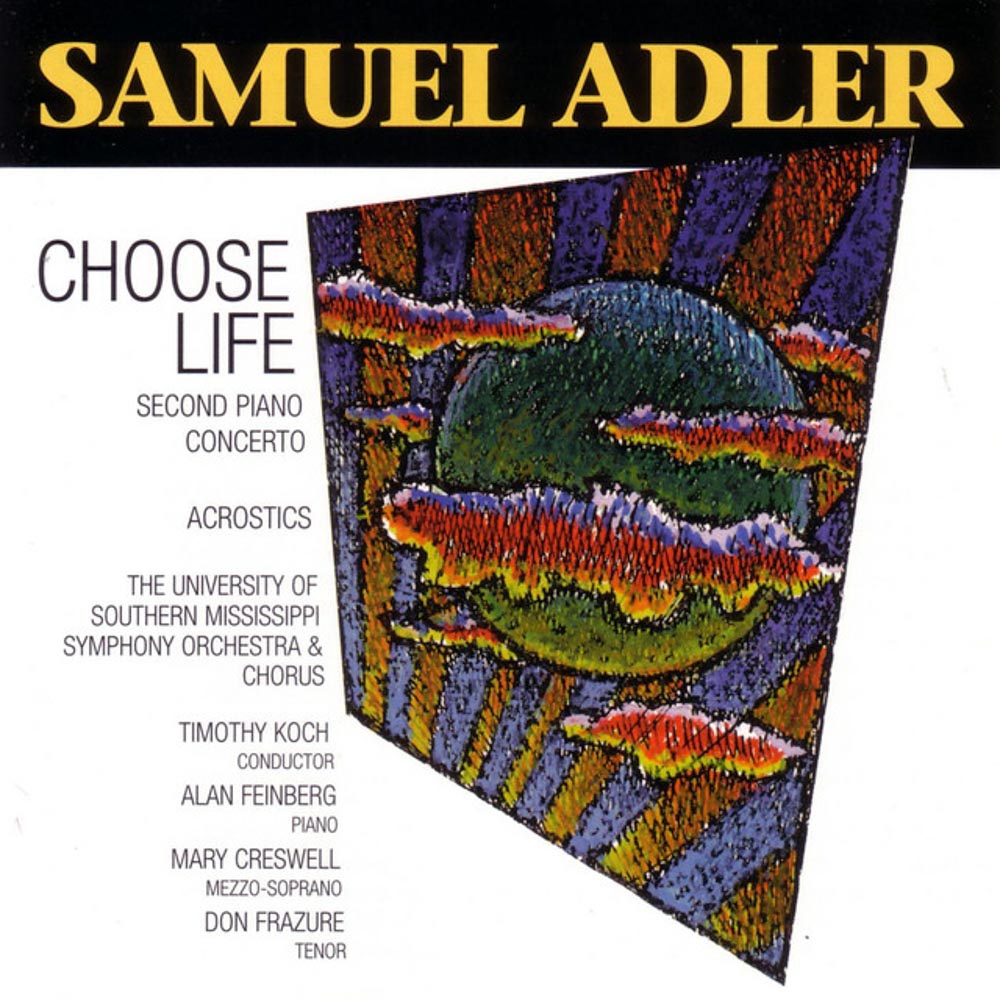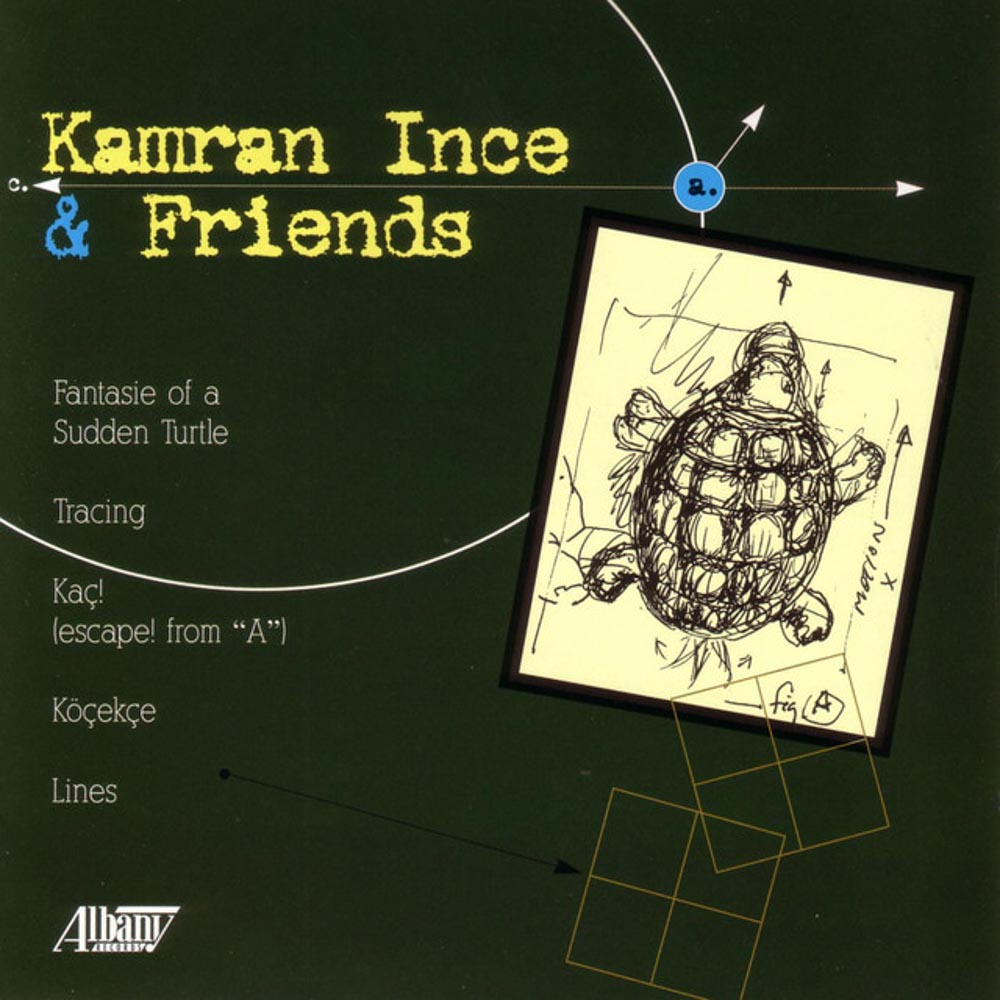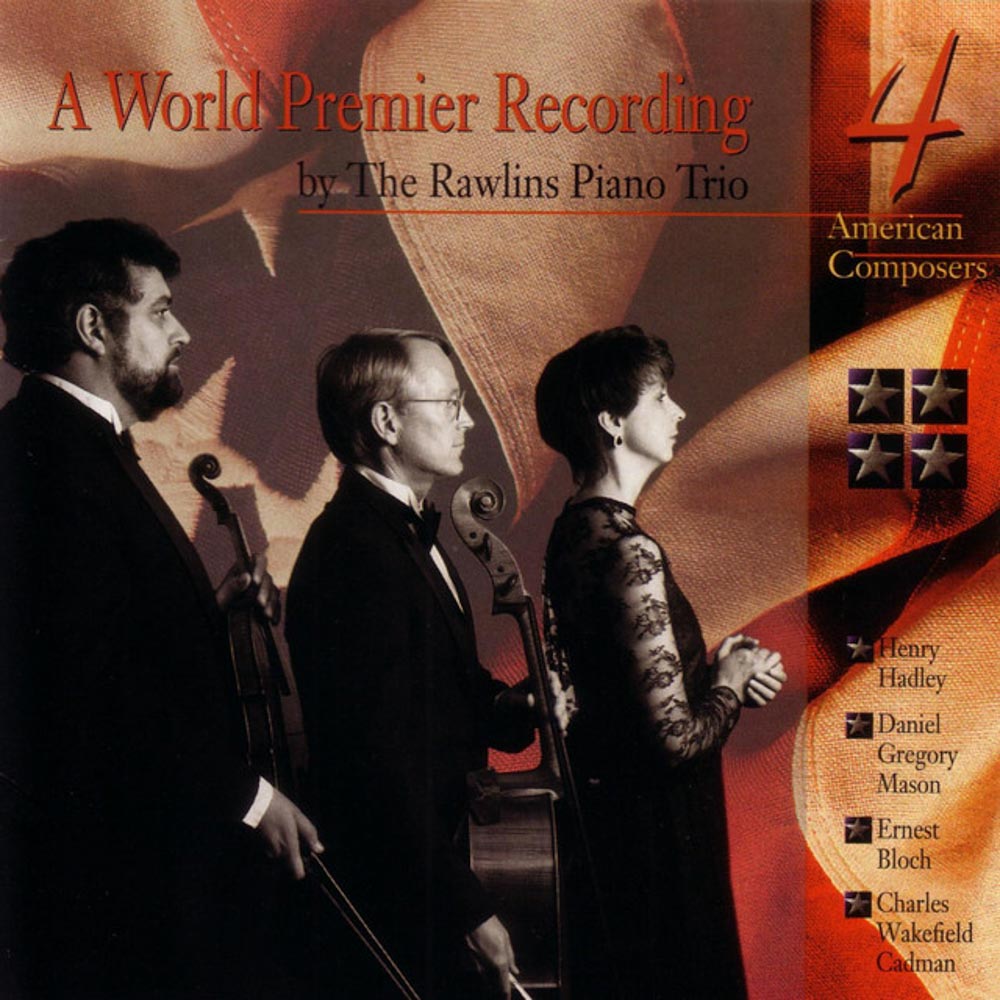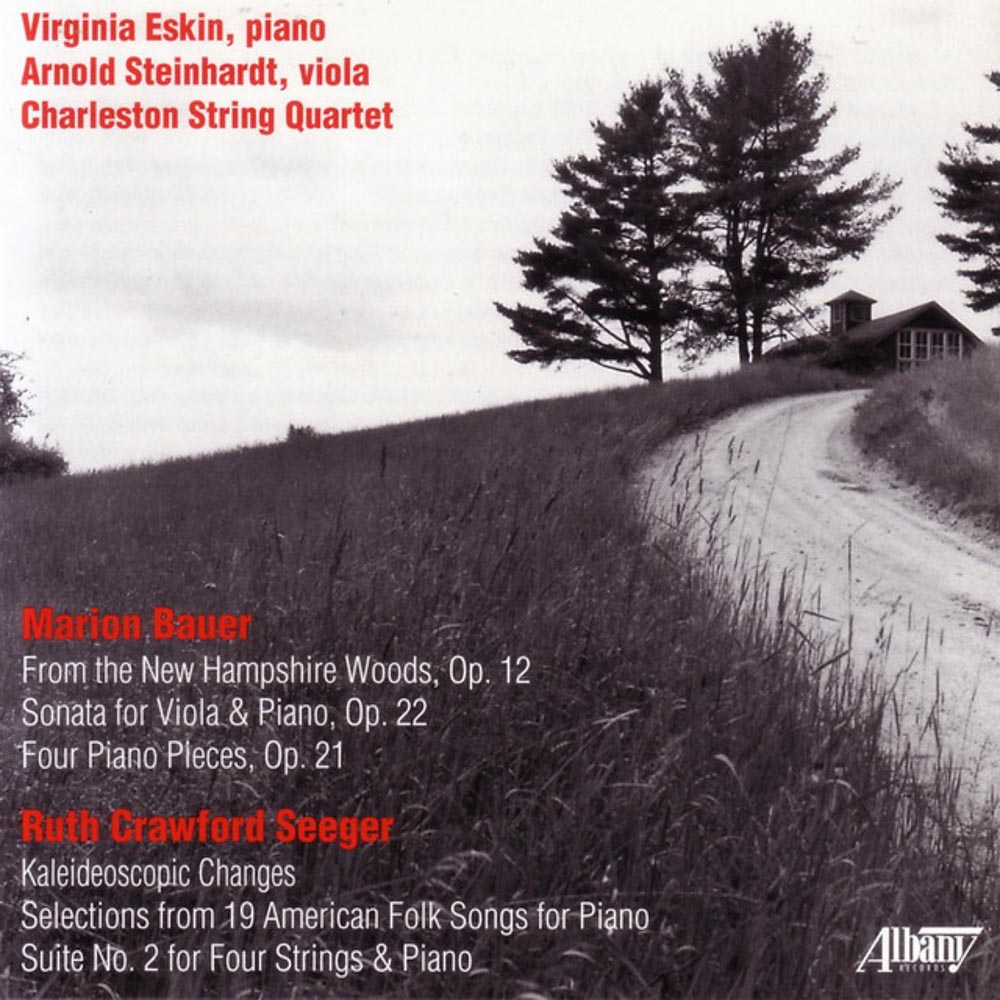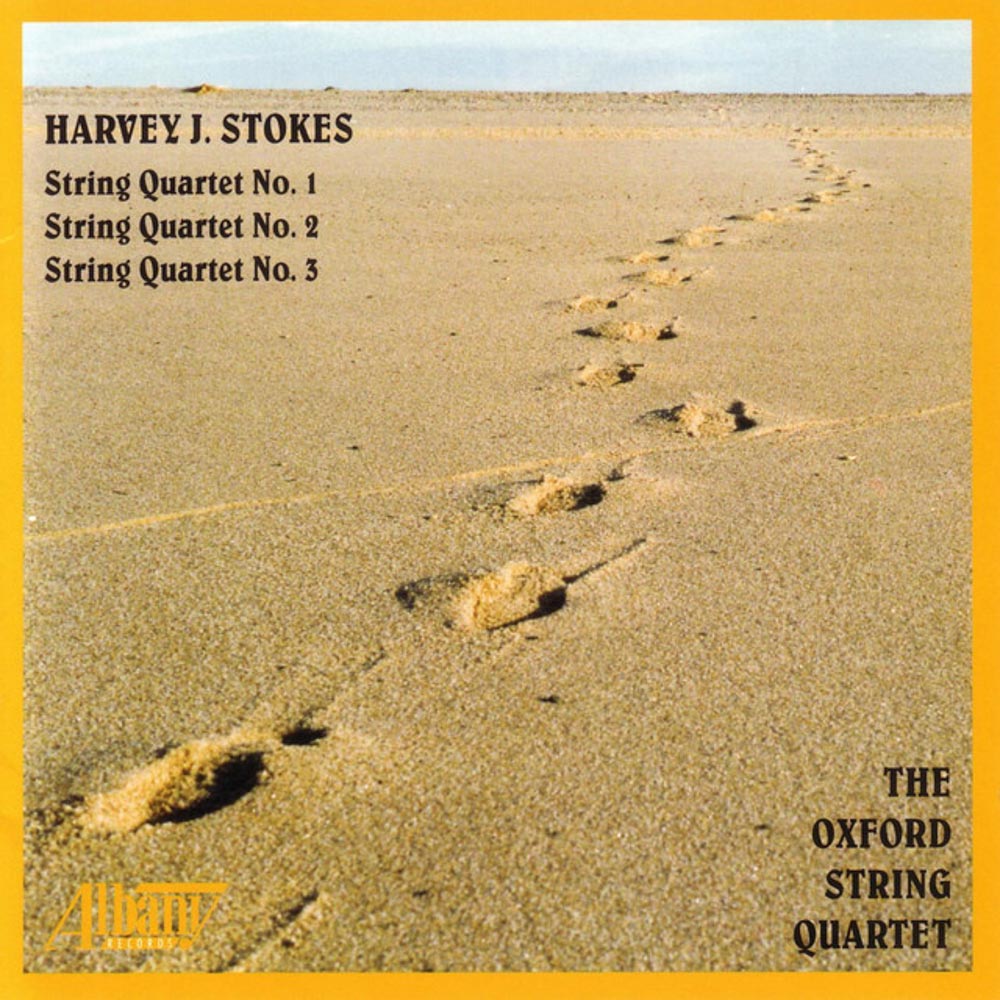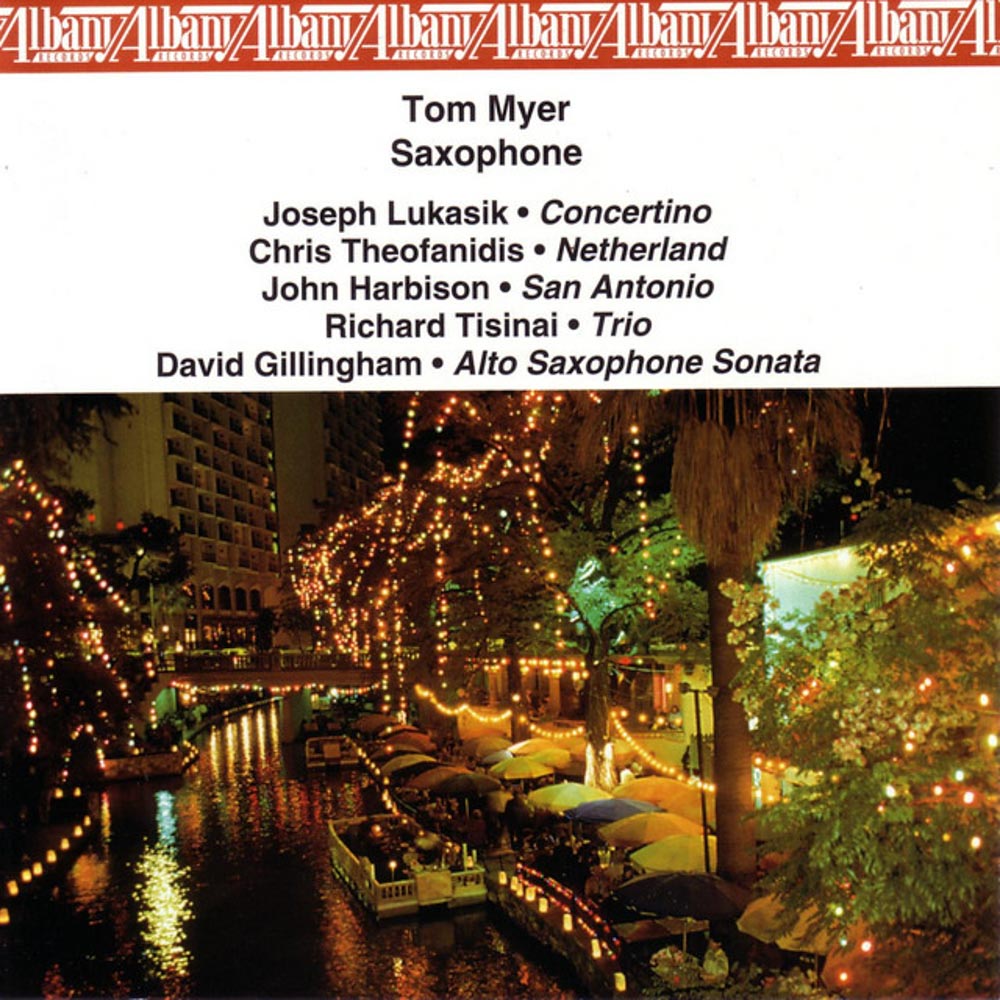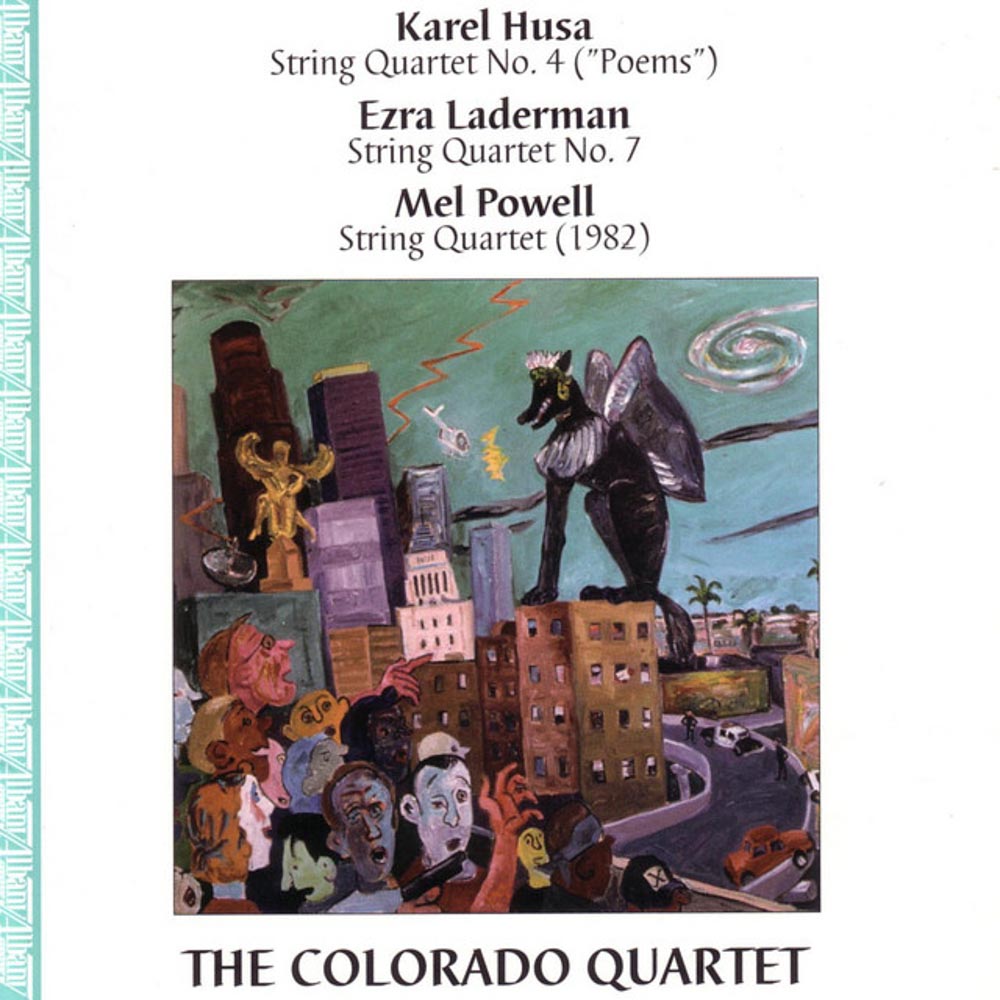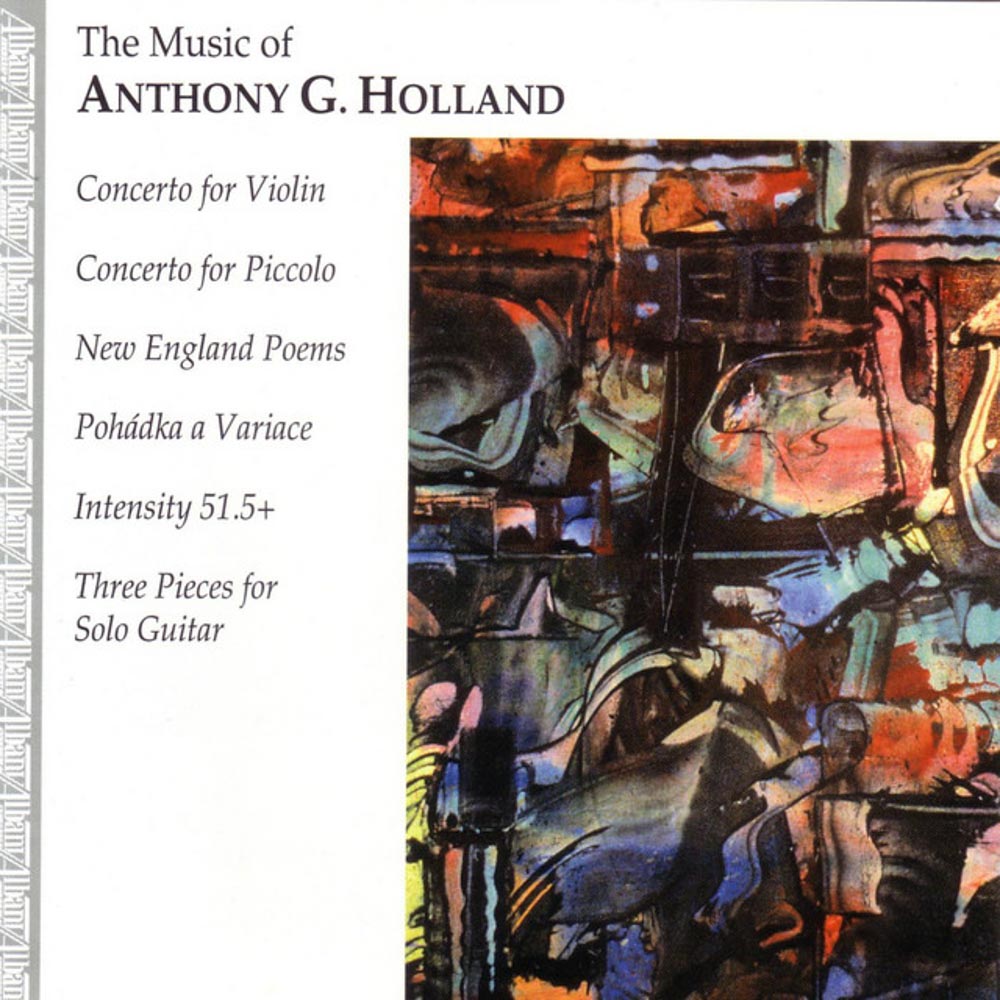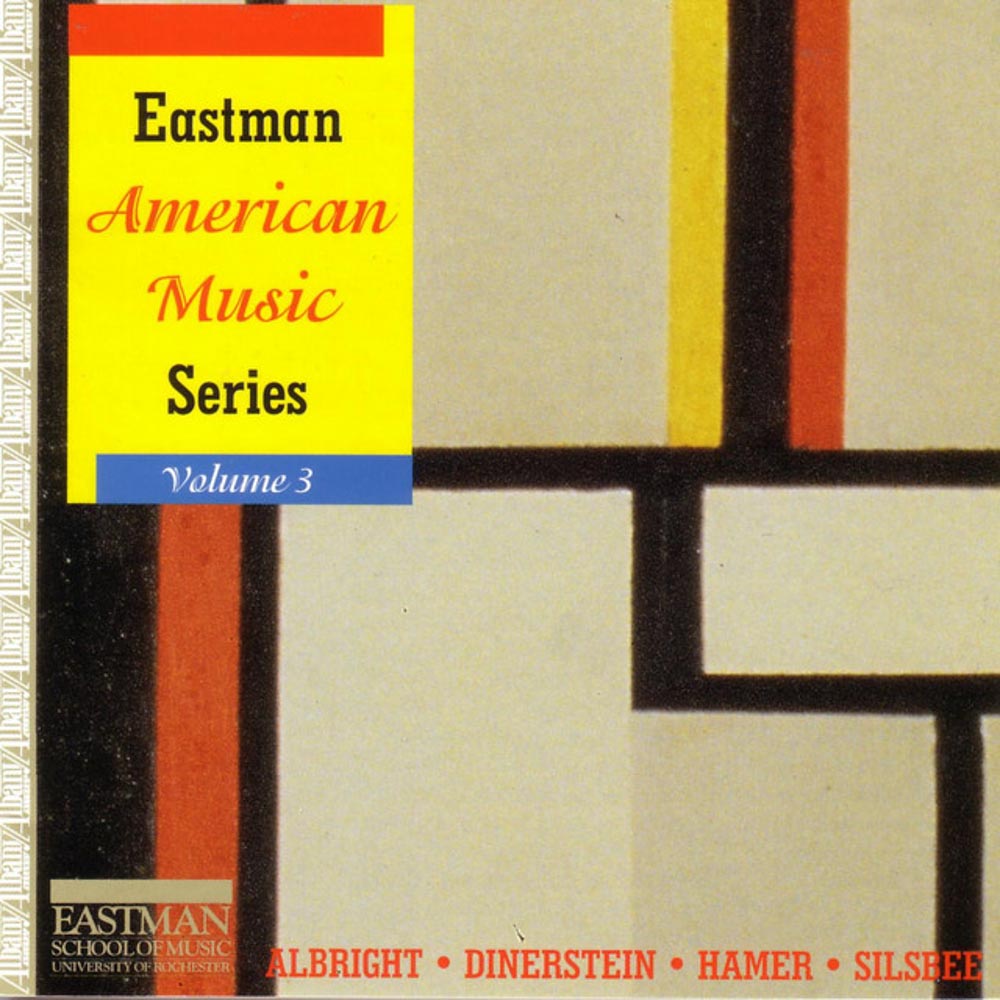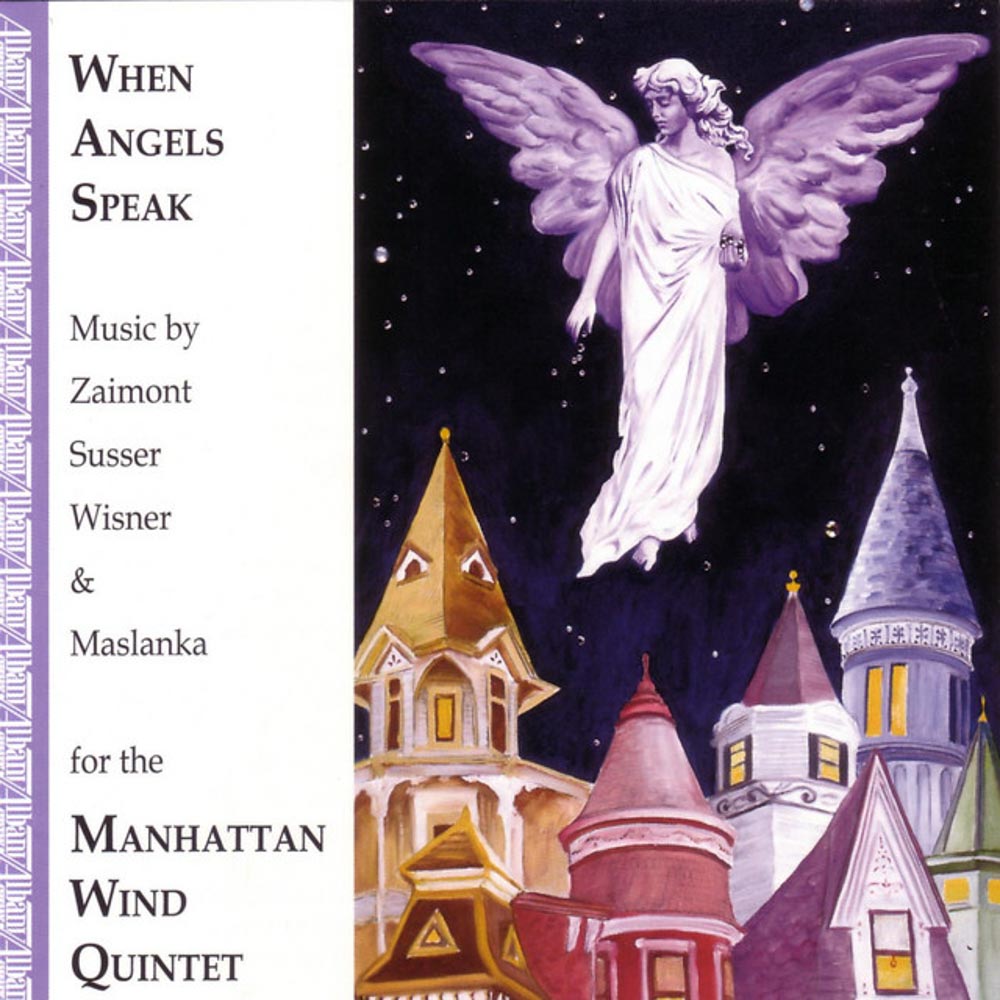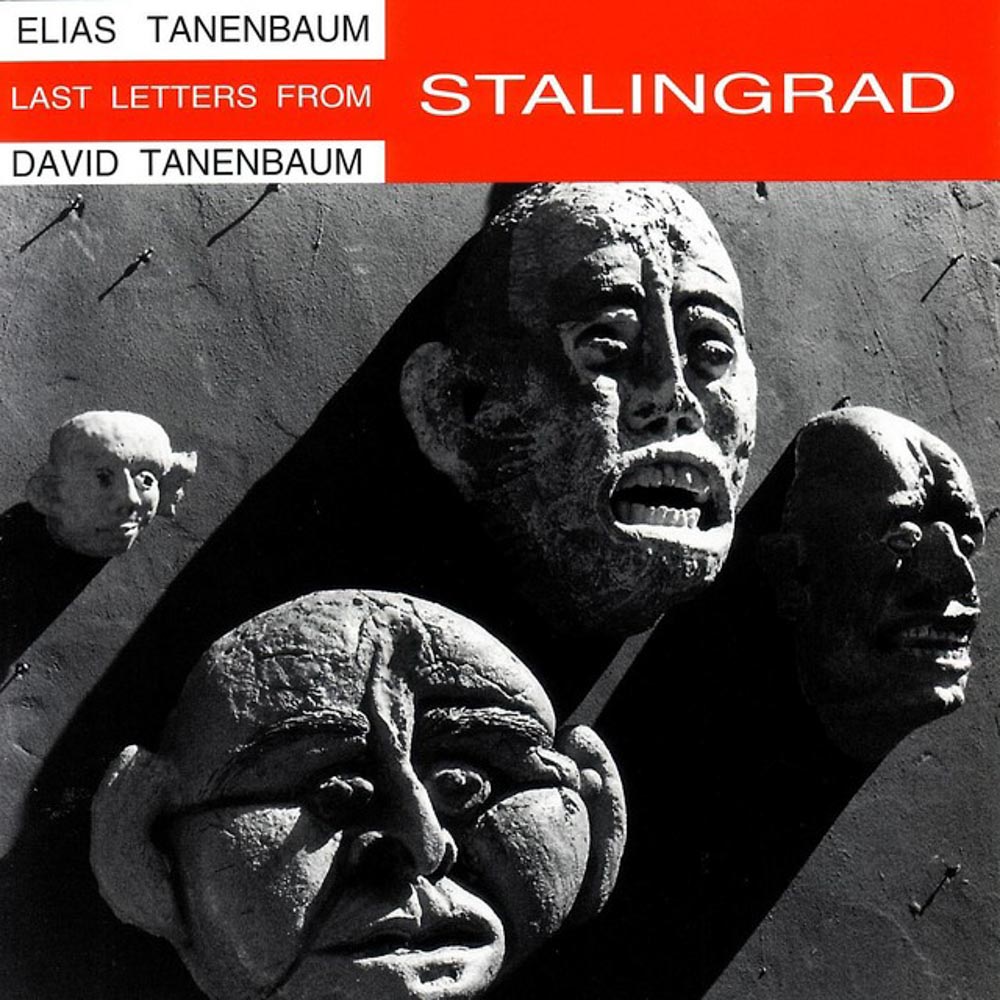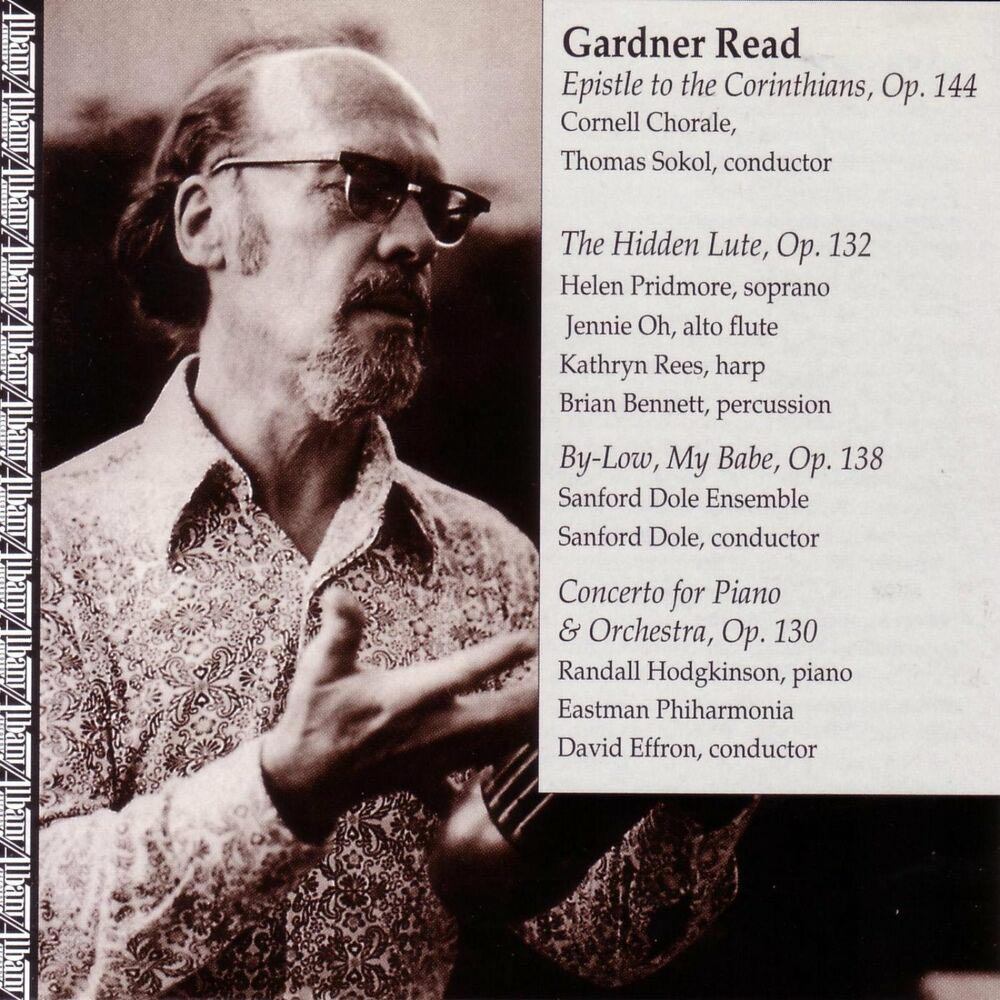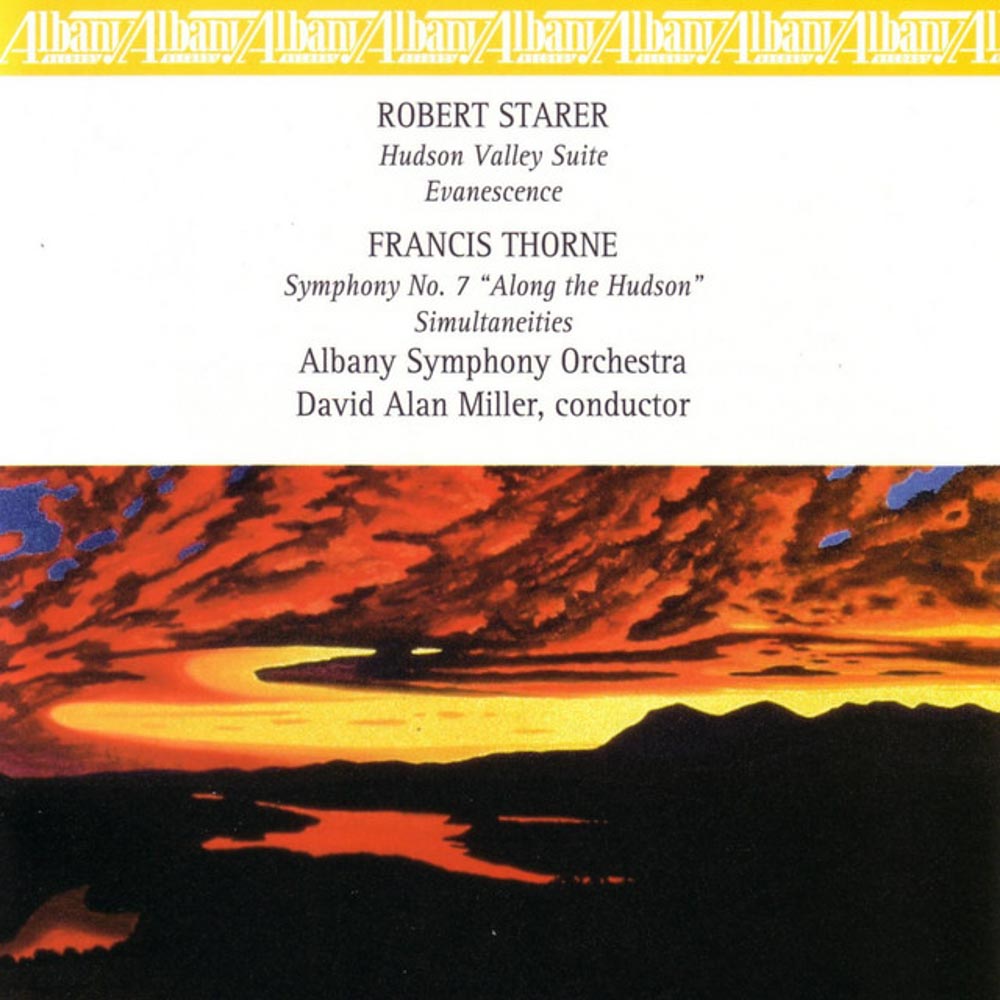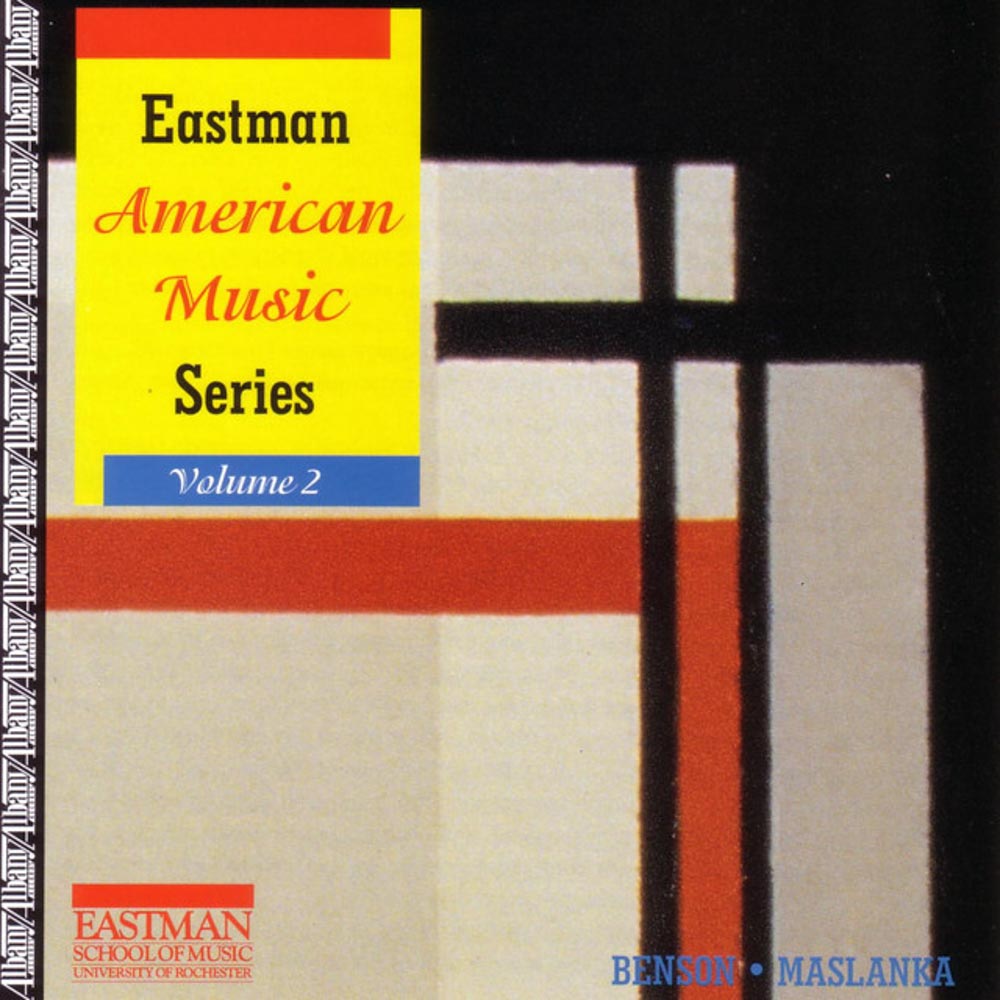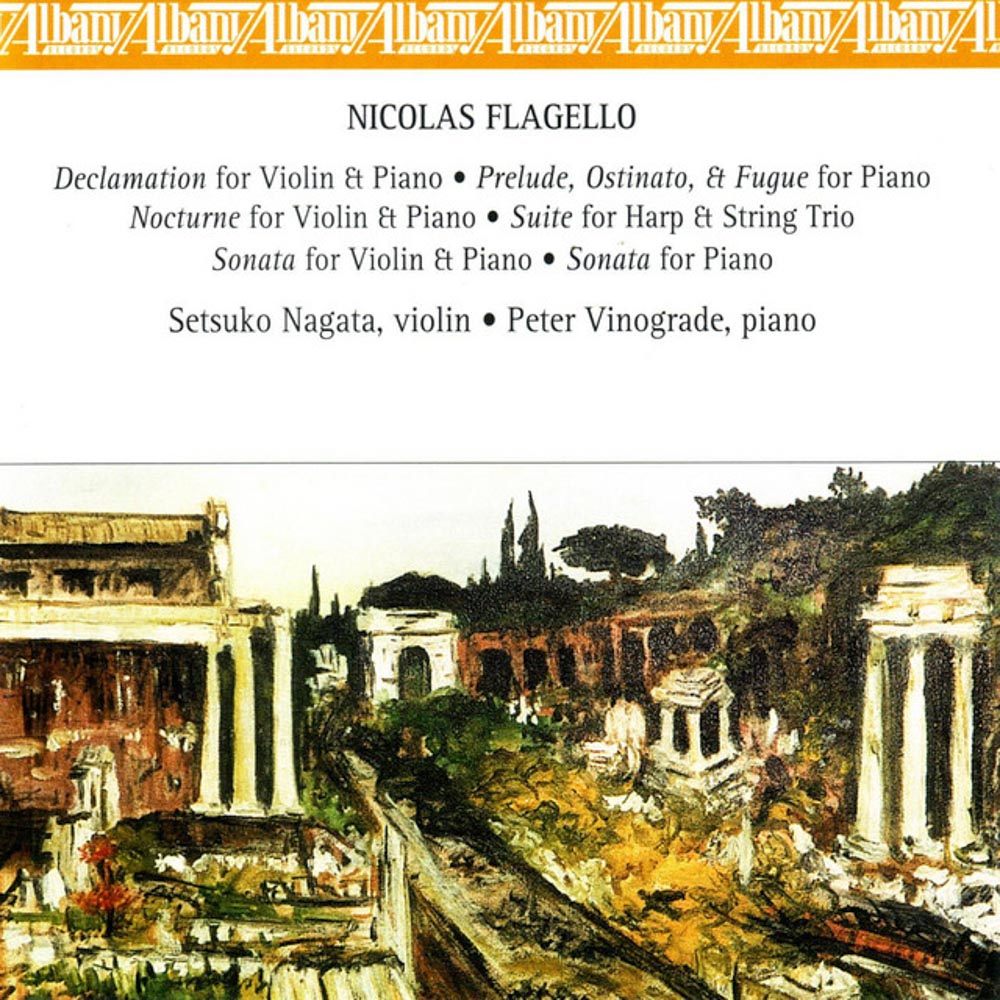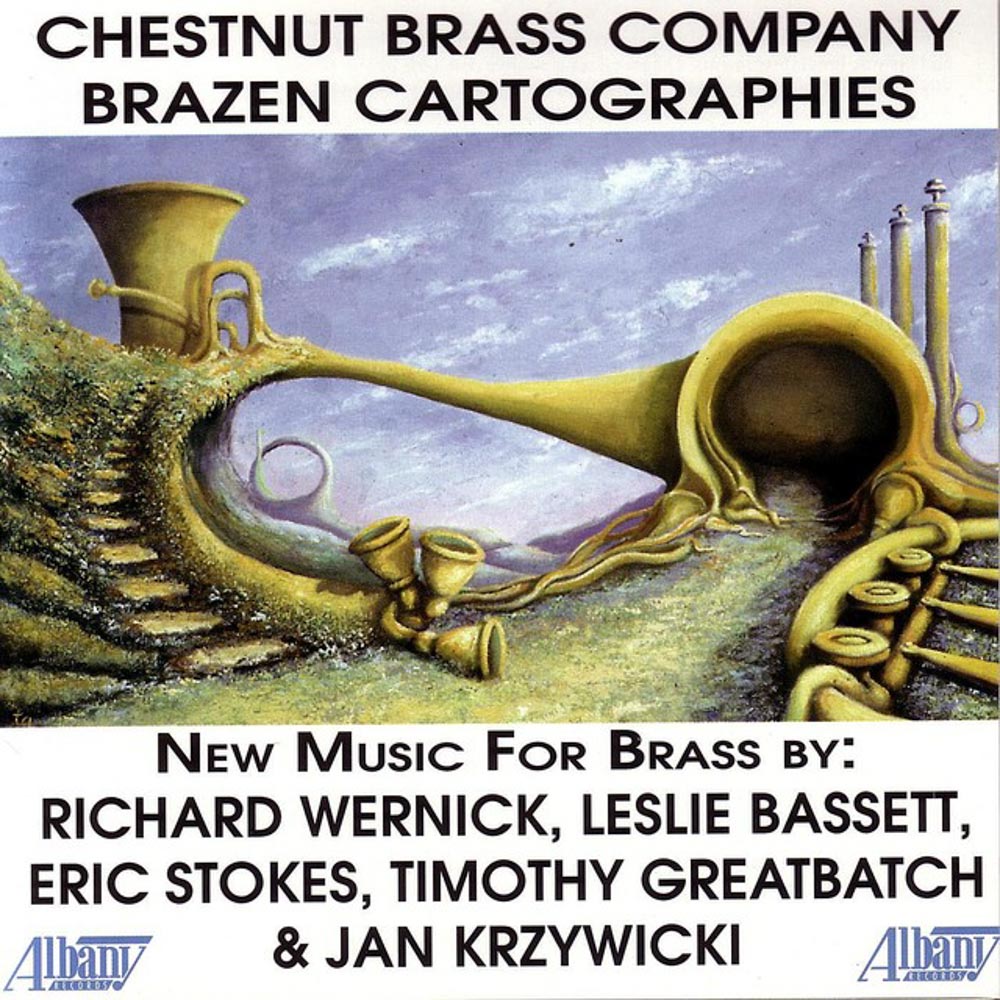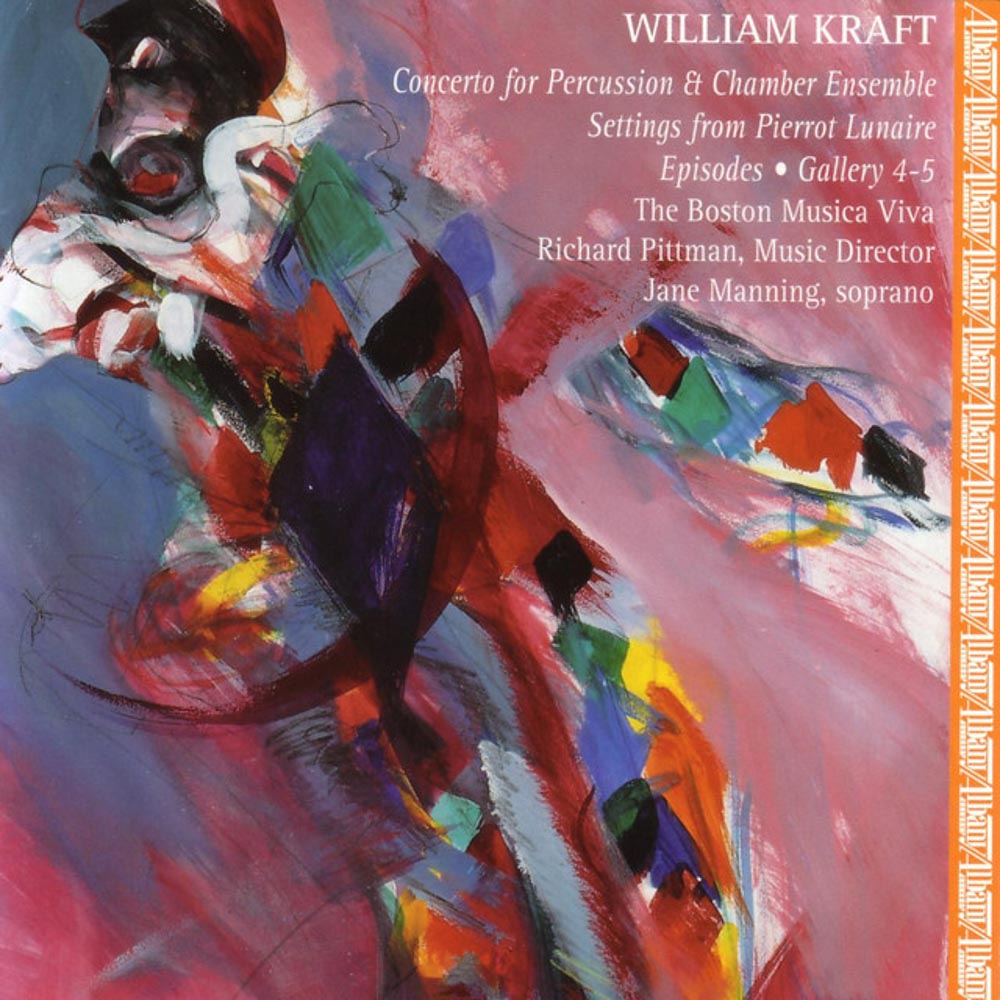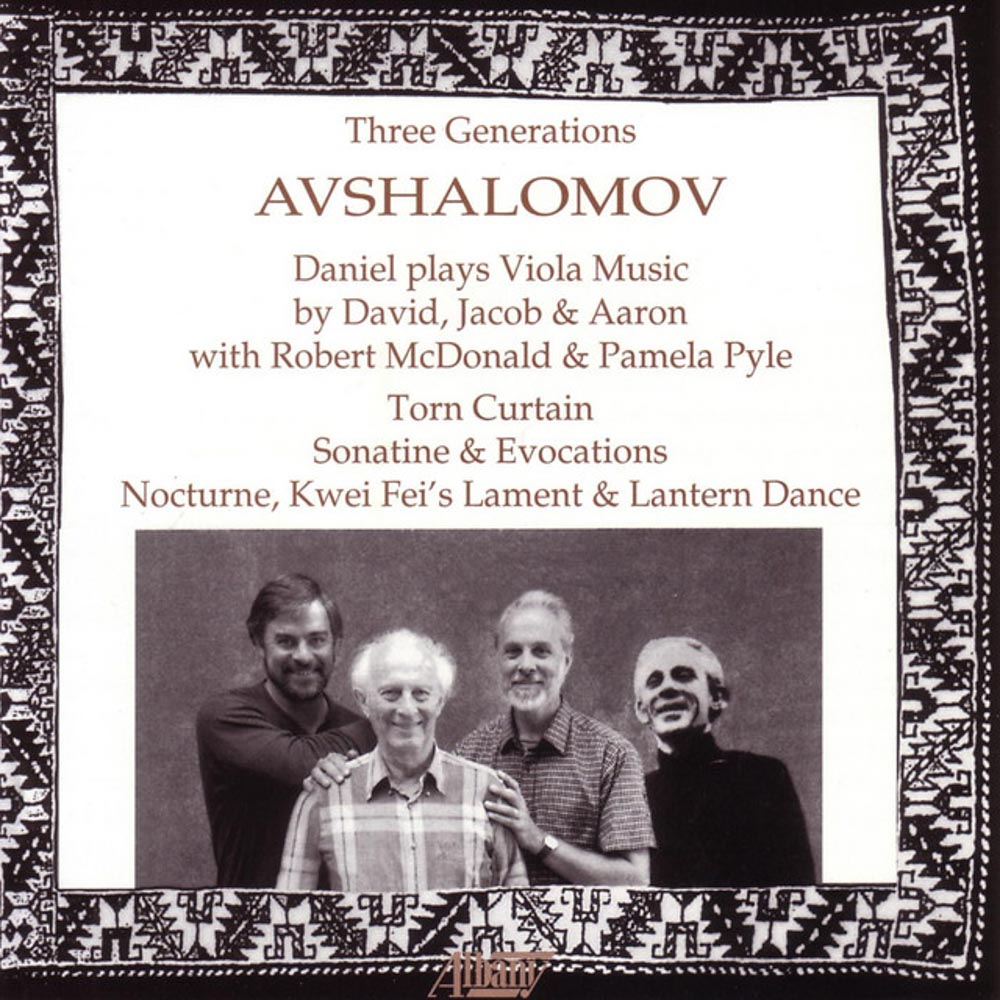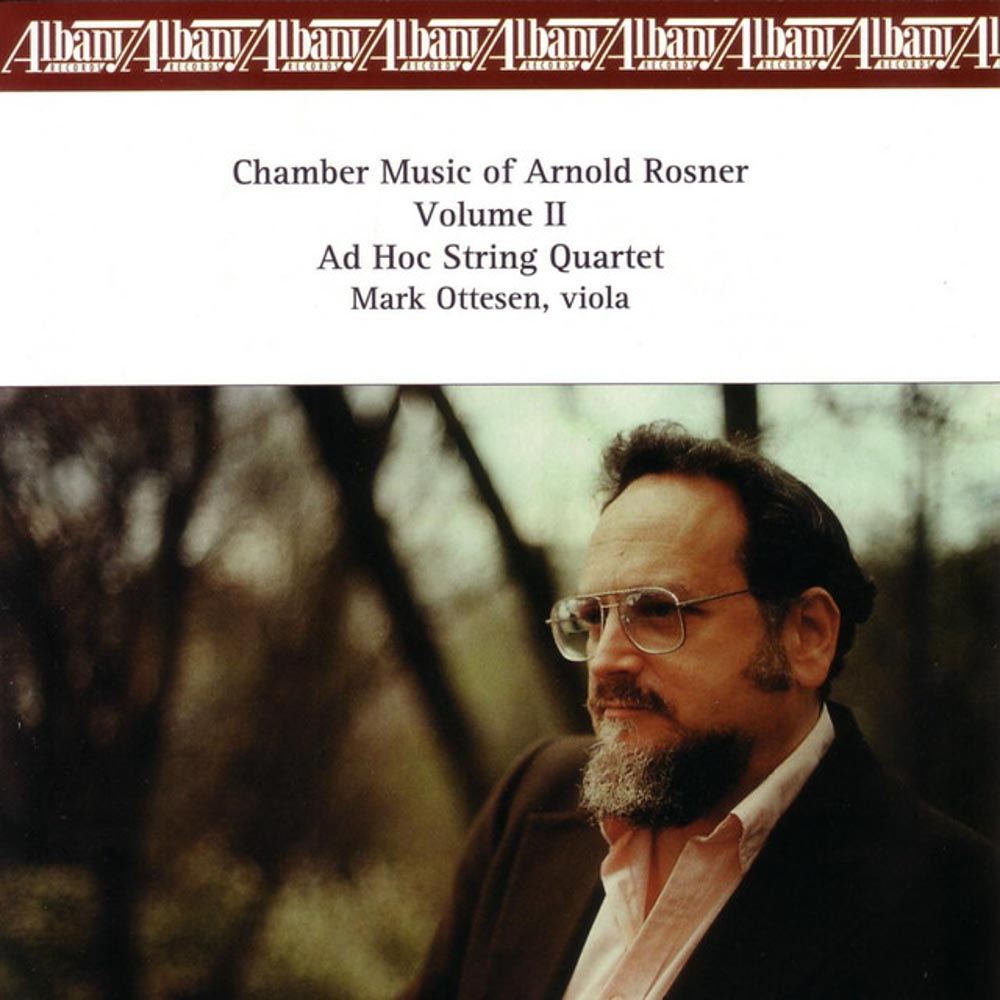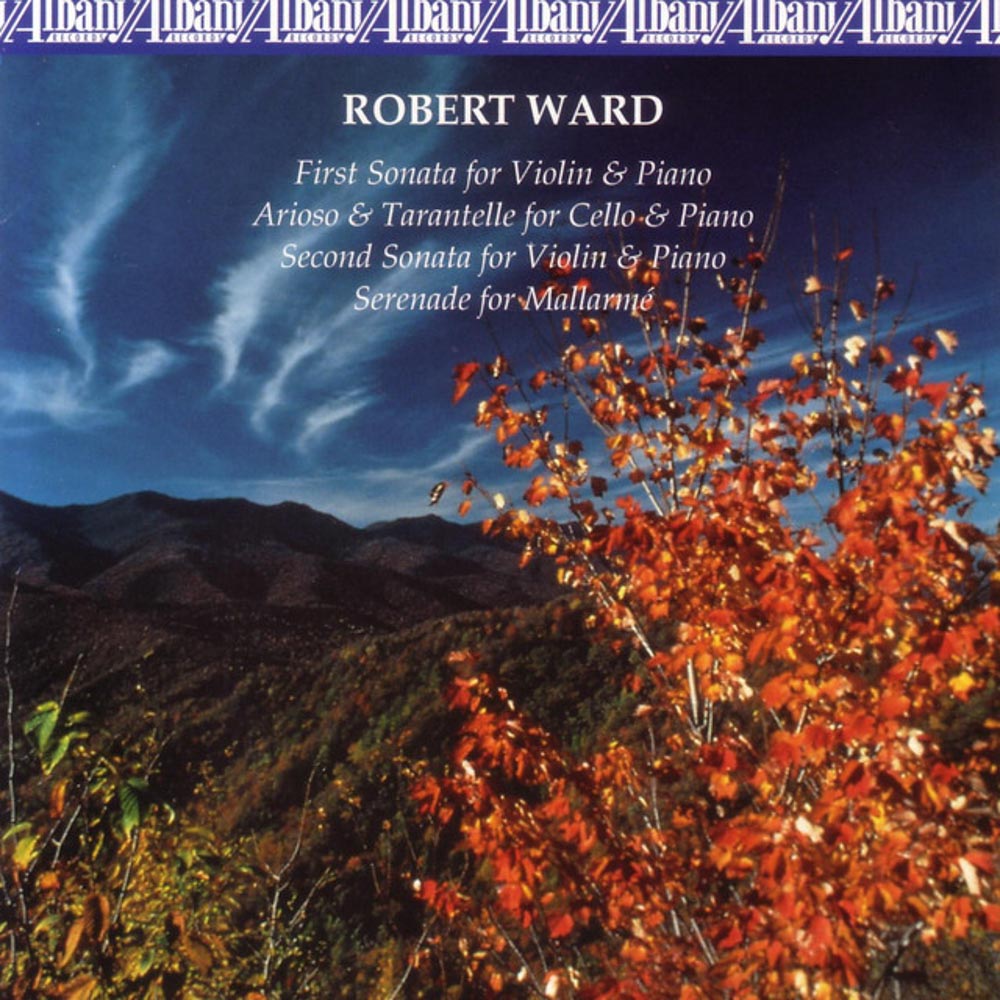Catalog #: TROY0337
Release Date: August 1, 1999ChamberA native of Philadelphia, Jan Krzywicki has studied with, among others, Vincent Persichetti, Nadia Boulanger and Darius Milhaud. He is active as a composer, conductor and educator. Since 1990 he has been conductor of the Philadelphia contemporary ensemble Network for New Music. He is a professor of music theory at Temple University, teaching courses in analysis, performance practice, and ear training.
Catalog #: TROY0301
Release Date: August 1, 1999ChamberIn 1927, Bernard Herrmann was a sixteen year old student at DeWitt Clinton High School in New York. Bored by his instructors, he eagerly sought out other rebellious spirits among his peers, and found one - a fellow composer, no less - in his German class: 14 year old Jerome Moross. A close friendship began, and for the next several years the two friends explored the musical by-ways of New York together, attending concerts and seeking out such composers as Aaron Copland, Charles Ives, George Gershwin and Morton Gould. In the early 1930s, as members of the Young Composers Group - a small band of New York composers modeled after the Russian Five, and led by Copland, Herrmann and Moross gave the first public performances of their music. Both composers were inspired by the vigorous American idiom of Ives, Copland and others; but while Herrmann's music was increasingly shaped by European models, Moross was most drawn to American folk music and other popular forms. Now, all these years later, here these two friends are joined in their music on this delightful disc.
Catalog #: TROY0323
Release Date: June 1, 1999ChamberEchoes of America was commissioned by the Raleigh Chamber Music Guild in celebration of Robert Ward's 80th birthday. Jimmy Gilmore, the clarinetist for the piece, responded to the idea of a title for the trio with Echoes of America. He felt that each of the four movements related to some aspect of American musical culture in the southeastern part of the country. The work was completed in June 1997. About Appalachian Ditties and Dances the composer writes: "This work reflects the interest I have had in American folk music in general since the 1950's and in Appalachian music in particular since the 1970's when my wife and I had a second home in Sparta, North Carolina. The richness and vitality of that music is unparalleled by that of any other region of the country. The mountain folk are a singing people and the tunes are an inspiration or a solace for a wide spectrum of human feeling." The Raleigh Divertimento was commissioned by the Raleigh Chamber Music Guild for the Aspen Wind Quintet. "My great fascination with the beauties and difficulties of writing for the medium dates from the late 1940's when I coached woodwind ensembles at the Juilliard School. The creation of the work started with the melodies inspired by the sounds of the instruments." Lamentation first appeared as "Of Ancient Guilt" for piano and dancer and is dedicated to dancer Judith Martin who commissioned it and gave the first performance in 1947 at the Studio Theater in New York. Scherzo, which is frequently performed with Lamentation, was first performed in 1951 at the Peabody Conservatory by William Crystal. Dialogues for Violin, Cello and Piano first appeared as Dialogues for Violin, Cello and Orchestra, written on commission from the Chattanooga Symphony for its 50th anniversary season, 1982-83. The Chamber version of the work was premiered at Duke University on February 4, 1984.
Catalog #: TROY0311
Release Date: June 1, 1999ChamberAn internationally celebrated soloist and chamber musician, clarinetist Nathan Williams has been praised for his "sublime control," "silky sound," and "dazzling technique." He is principal clarinetist of the River Oaks Chamber Orchestra in Houston and a founding member of Strata, a clarinet, violin and piano trio that has commissioned and performed music for this ensemble for the past 20 years. He is a frequent guest performer and teacher at conservatories, colleges and universities across the country and abroad. Williams has appeared at Alice Tully Hall, the Kennedy Center, and Merkin Hall as well as having given concerts throughout the world including Europe, China, Israel, and Japan. His recordings appear on Albany Records, CRI, Naxos, New Dynamic Records and Arizona University Recordings. A graduate of Eastman and Juilliard, Williams is an artist/clinician for Vandoren and a Buffet Group USA Performing Artist.
Catalog #: TROY0320
Release Date: May 1, 1999ChamberDavid Liptak was born in Pittsburgh in 1949. After teaching composition and theory at Michigan State University and the University of Illinois, he joined the faculty of the Eastman School in 1987, where he has chaired the composition department since 1993. In 1994, he was commissioned by the Fromm Music Foundation to write a trumpet concerto for the Rochester Philharmonic Orchestra, which was premiered in 1996. In 1995, he was awarded the Elise L. Stoeger Prize by the Chamber Music Society of Lincoln Center in recognition of distinguished achievement in the field of Chamber music composition. Other discs of his music appear on Gasparo and Opus One.
Catalog #: TROY0328
Release Date: April 1, 1999ChamberSamuel Adler was born in Mannheim, Germany, on March 4, 1928. A prominent and important educator, Adler has enjoyed what might be called the patronage of the American University, which is the 20th century equivalent of the 17th century's church and the 18th century's court. Just as composers in the past often owed their allegiance to and drew their salaries from religious leaders or noblemen, so a large number of professional composers today are employed by colleges and universities, where they have many duties besides writing music. Adler's career is typical. In addition to being the creator of over 400 published works, he has also been a teacher, administrator, and author of textbooks. In 1966 he became Professor of Composition at the Eastman School, a position from which he recently retired; in 1974 he became chairman of the Composition Department; in 1984 he was named Mentor of the University of Rochester. He has published books on orchestration, musicianship, and choral conducting. And, like his counterparts two and three centuries ago, he is an accomplished conductor. Acrostics is a concerto for harpsichord, flute, oboe, clarinet, violin and cello. The work was written in 1985 as a Christmas present for the composer's good friends Barbara Harbach and Thomas George. Harbach had been performing the Harpsichord Concerto by DeFalla and Adler wanted to write a companion piece for that work for the same combination of instruments. The work was premiered in the fall of 1986 by Barbara Harbach, harpsichord, and members of the Buffalo Philharmonic Orchestra in Buffalo, New York. The Second Piano Concerto was commissioned by the Friends of Today's Music for the Music Teachers Association of California for the 100th Anniversary of the Organization in 1997 and premiered at their convention in San Francisco July 7, 1997. Choose Life , written in the summer of 1986, was commissioned by Robert Shaw and the Atlanta Symphony Orchestra. It is a celebration of life.
Catalog #: TROY0310
Release Date: January 1, 1999ChamberKamran Ince is rapidly emerging as one of today's most exciting and original young composers. He was born in Montana to American and Turkish parents. His early musical training was in Turkey at the Ankara and Izmir conservatories. Later he attended the Oberlin Conservatory and the Eastman School of Music, where he earned a Doctorate. Among his teachers were Christopher Rouse and Joseph Schwantner. He is currently a member of the music faculty at the University of Memphis. About Fantasie of a Sudden Turtle the composer writes: "First of all the title has nothing to do with ninja turtles. The contradiction between sudden and turtle is a reflection of my love for contrast and also represents this particular turtle's desire to do a lot of things it cannot. The work consists of a sequence of fantasies, dreams that a turtle might have." About Kac! (Escape from "A") Ince writes: "Kac has the meaning in Turkish of How many? or Escape. The work contains extreme contrasts with sections ranging from complete stasis to raw, savage activity." And finally about Kocekce Ince writes: "Kocekce is the name of a folk dance found in the Black Sea region of Turkey. The music is always very fast with constant irregular meters. It is usually played by the Kemence, a string instrument similar in size to a small violin."
Catalog #: TROY0305
Release Date: January 1, 1999ChamberThe composers of these trios all were born within a ten year span, and were of considerable significance in the first third of the 20th century, when American music was first finding its voice. They are representative of different currents in the musical stream, and the details of their lives and interactions provide insight into the American classical world music world during a fascinating period in our history. Hadley was born in Somerville, Massachusetts and studied with Chadwick at the New England Conservatory. He also studied in Europe with Ludwig Thuille. He was the conductor of the Seattle Symphony, the San Francisco Symphony and the New York Philharmonic. His Piano Trio was composed in 1932 and is in a four movement symphonic form. Virtuosic string writing is evident throughout, as is Hadley's flair for lyrical melody. Daniel Gregory Mason was born in Brookline, Massachusetts into one of this country's most important musical families. His father Henry was one of the founders of the Mason and Hamlin piano company and his grandfather, Lowell was one of the most influential composer and educator of the 19th century. His uncle, William, studied piano with Liszt and played a major role in the development of classical music in this country. He studied with John Knowles Paine at Harvard and in France with Vincent D'Indy. He composed his Sentimental Sketches, Op. 34 in 1935. Bloch was born in Geneva but came to this country in 1916 to teach at the Mannes School. In 1920 he accepted the Directorship of the Cleveland Institute in 1920. He took the same position at the San Francisco Conservatory in 1925. He became an American citizen in 1924. He composed his Three Nocturnes in 1924. Cadman was born in Johnstown, Pennsylvania. He studied music theory with Leo Oehmler and Organ with W.K. Skinner. He became very interested in music with American Indian themes. In 1916, after years of traveling, lecturing on American Indian music, he moved to Los Angeles where he composed operas, film scores and Orchestral works. He was a founder of the Hollywood Bowl and was awarded an honorary doctorate by the University of Southern California in 1926. He composed his Trio in D Major in 1914. It was his very first venture into Chamber music. It demonstrates beautifully his love of melody. This disc fills an important gap in the catalog of early American Chamber music. Detailed and informative program notes.
Catalog #: TROY0297
Release Date: September 1, 1998ChamberMarion Bauer and Ruth Crawford Seeger began their life-long friendship in the summer of 1929, when both enjoyed privileged living at the MacDowell Colony in Peterborough, New Hampshire - a haven for American artists since 1907. At a time when women in music had to face down Victorian stereotypes of dilettantism and sentimentality, the MacDowell Colony provided "a room of one's own." A Peterborough regular, Bauer came for her first visit in 1917. Within two days of arriving for what would be her only stay there, Crawford wrote how it was "glorious to be working again...I never knew the moon and stars could come inside me so." Considering their historical reputations, few people would suspect the meeting points between these two composers - Bauer, representing what Carol Oja in her forthcoming book calls the "forgotten vanguard," and Crawford, known today as a pivotal figure in the radical "ultra-modern" movement. But back then, both believed strongly in the manifest destiny of a similar kind of modernism: both spent the 1920s exploring frontiers of harmony; both greatly admired Scriabin, taking his mystical impressionism as their starting point; and both were influenced by transcendentalist aesthetics. After hearing some of Bauer's piano preludes, Crawford recorded her impressions in her diary: "I am bewildered by the strangeness of the experience, by our affinities. Our manner of building, our feeling very strongly the spirit of our work, our strengths and weaknesses - in all these, though we are individuals, yet we are very close. Though we have only just met, yet our spirits have been friends for years." And now their musics are joined on this beautifully performed new disc. There is no greater proponent of this music than Virginia Eskin, a proven, superb American artist.
Catalog #: TROY0273
Release Date: July 1, 1998ChamberThe real draw for this disc is the presence of the great trumpet player, Adolf Herseth from the Chicago Symphony Orchestra. For indeed, he is one of a kind, a true master recognized for his brilliant musicianship by his colleagues and audiences the world over. "Quite possibly the most dazzling player on his instrument in the world today," says Donal Henahan in The New York Times. Mr. Herseth was appointed Principal Trumpet of the Chicago Symphony in 1948 immediately after graduating from the New England Conservatory. A native of Minnesota, he also holds a degree from Luther College in Decorah, Iowa. During World War II he served as a bandsman at Iowa prefight school and ended his military service with the Commander of the Philippine Sea Frontier in the South Pacific. His years with the CSO have included numerous solo appearances and concerts with many of the world's finest conductors, not to mention work on some of the finest recorded performances in the repertoire. The Asbury Brass Quintet is based in Chicago. Mr. Herseth, who joins them in the performance of the Bohme Sextet, has touched the lives of each one of the members of the Quintet's players, either as a teacher, colleague or mentor.
Catalog #: TROY0288
Release Date: June 1, 1998ChamberDr. Harvey J. Stokes is professor of music at Hampton University, and founder and director of the Computer Music Laboratory. His degrees are from Michigan State University, the University of Georgia and East Carolina University. He writes about this music: "One of several pinnacles in my creative career has been the composition of a trilogy of works for the Oxford String Quartet. My String Quartet No. 1 was commissioned by this ensemble and completed during the fall of 1990 in Hampton, Virginia. Since its premiere in 1991, it has been performed many times by them to great acclaim. Due to the success of this work, I decided to dedicate two additional compositions to the Oxford String Quartet. String Quartet No. 2 and String Quartet No. 3 were completed in 1992 and 1995 respectively. String Quartet No. 3 was premiered in 1996 on a concert celebrating the 50th anniversary of the founding of the Oxford String Quartet, and String Quartet No. 2 was premiered later that year during a concert tour of Argentina by the ensemble." In the Oxford String Quartet innovation and tradition come together. The Cleveland Plain Dealer raves about "vibrant, spell- binding strings...first class from top to bottom...who interacted with a corporate sense of articulation, balance and nuance provided by only the most astute Chamber players."
Catalog #: TROY0282
Release Date: April 1, 1998ChamberIrwin Bazelon died on August 2, 1995 at the age of 73. He composed nine symphonies and over 60 Orchestral, Chamber and instrumental pieces. Born in Evanston, Illinois, he graduated from DePaul University with a bachelor's and master's degree in music. After studying composition with Paul Hindemith at Yale briefly, he went to Mills College in Oakland, California with Darius Milhaud. From 1948 until his death, he lived in New York City and Sagaponack. His Long Island retreat was the perfect counterpoint for the tensions and hustle-bustle of urban life with which his rhythmically complex and often jazz-tinged music bristles. In his early years in New York, Bazelon supported himself by scoring documentaries, art films and theatrical productions. During the 1950's and 1960's he composed more than fifty scores of this kind, which proved to be an invaluable preparation for his Orchestral music. As a valedictory of sorts he wrote Knowing the Score: Notes on Film Music. Published in 1975, this book is widely used as a college text. As a guest composer Bazelon frequently lectured at leading universities and music schools throughout the United States and England. Young people were especially drawn to his feisty spirit and no-nonsense approach to earning a living by applying compositional talents to the commercial world without sacrificing integrity. A long-time horse racing enthusiast, one of his best known works, Churchill Downs (Chamber Concerto No. 2) is named for the home of the Kentucky Derby, and his ninth symphony (subtitled Sunday Silence for the winner of the 1989 Derby) is dedicated to the horse. Definitely an interesting man who gives us interesting music.
Catalog #: TROY0275
Release Date: April 1, 1998ChamberTom Myer is the Professor of Saxophone for the College of Music at the University of Colorado at Boulder and has served as the Director of Jazz Studies from 1988-95. He received his M.M. degree in woodwind performance and jazz studies from North Texas State University. He earned his undergraduate degree in music education from the University of Wisconsin-LaCrosse. He has worked professionally for Woody Herman, Nelson Riddle, Ice Capades and Disney World, and has backed up such names as Dave Grusin, Doc Severinson, Bob Hope, Dionne Warwick and numerous others. Joseph Lukasik is on the music theory and jazz faculties at the University of Colorado at Boulder. In 1993, he received first prize in the Barlow International Composition Competition. Chris Theofanidis' Netherland was commissioned by Worldwide Concurrent Premieres and Commissioning Fund, as a consortium commission. There are two versions of the work, one for piano and one for Orchestra. David Gillingham is Professor of Music Composition at Central Michigan University in Mt. Pleasant, Michigan.
Catalog #: TROY0259
Release Date: October 1, 1997ChamberKarel Husa's String Quartet No. 4 (Poems) was commissioned by the National Endowment for the Arts for the consortium of the Colorado, Blair and Alard Quartets. The works was completed in the spring of 1990 in Ithaca, New York. A collection of six poems, the String Quartet No. 4 explores possibilities of unusual sonorities in a virtuosic writing. When Lucy Mann of the Naumburg Foundation requested a new work for the Colorado Quartet in 1983, Ezra Laderman thought the proposal over for about a week, and it was during this time that he realized that his Quartet No. 6 could be the first work in a triptych. He felt ready now to take the same material he had used in No. 6, music inspired by four youthful personalities, and place it "in the midst of life" as Laderman says. The four-note-motive of NO. 6 strides out again at the beginning of No. 7 - only now it is inverted, so that it reaches muscularly upward. The String Quartet 1982 by Mel Powell was composed for the Composers String Quartet, the Sequoia String Quartet and the Thouvenel String Quartet under a consortium commission from the National Endowment for the Arts, which, at the same time, commissioned this quartet and quartets from Milton Babbitt and Elliott Carter. Powell's Quartet is played through as a single movement with clearly differentiated subdivisions.
Catalog #: TROY0258
Release Date: September 1, 1997ChamberAnthony Holland was born in Cleveland, Ohio in 1955 and studied at The Cleveland Institute of Music and Case-Western Reserve University. He studied with Donald Erb, Hale Smith and Leslie Bassett. Since 1982 he has been a Professor of Music at Skidmore College in Saratoga, New York. Holland composed his Piccolo Concerto to demonstrate that the piccolo could be used as an expressive solo instrument. Pohadka a Variace was composed and premiered in the spring of 1997. The title means fairy tale in Czech. The guitar pieces were composed for Joel Brown, the soloist who performs them on this disc. Intensity 51.5+ is a light-hearted reference to Varese's Density 21.5. The original piece was 51.5 measures long. The + means the soloist repeats the piece as many times as they feel necessary. The New England Poems was commissioned by Sandy Schwoebel, long-time editor of The Flutist Quarterly, for performance at the National Flute Association Convention in Boston in1993. The Violin Concerto was commissioned and premiered by the great Czech violinist Frantisek Novotny. The music of Anthony Holland will appeal to anyone who enjoys mainstream American music. It is accessible and tonal.
Catalog #: TROY0251
Release Date: September 1, 1997ChamberWilliam Albright was professor of composition at the University of Michigan at Ann Arbor from 1982 until his death. His Four Fantasies for harpsichord were commissioned by Douglas Reed, who performs them here and were composed at the American Academy in Rome. Norman Dinerstein was born in Springfield, Massachusetts and studied composition with Lutoslawski, Schuller, Copland, Foss, Sessions and Babbitt. He considered Arnold Franchetti his most important teacher. He chaired the departments of composition, musicology and theory at the Cincinnati College-Conservatory of Music. He was Dean of the college when he died of a heart attack in 1982. Love Songs is an example of his late music and uses words by the Brownings, Christina Rossetti and the Song of Solomon. This music is "Tonal, expressive and deeply humanistic." Ann Silsbee studied at Radcliffe College and Syracuse University. She received her doctorate from Cornell where she studied with Karel Husa. Janice Hamer studied at Harvard University and holds a master's degree in conducting from Westminster Choir College. She taught and conducted at St. Paul's Girls' School and at the Guildhall School of Music in London, where here music was performed in concert halls and on the BBC. She served as choral director at Haverford and Bryn Mawr Colleges before turning to composition.
Catalog #: TROY0254
Release Date: August 1, 1997ChamberCharles Knox is a former student of Bernard Heiden at Indiana University where he received the Ph.D. degree. He has written over 100 compositions and received commissions for conventional instruments as well as such unusual combinations as bassoon choir and tuba octet. His most recent compositions are a short opera, Workshop, a symphony for saxophone Orchestra, and a duo for piano and keyboard percussion called Attempted Claviercide. Clouds are not Spheres for flute, cello and piano was composed in 1994 especially for the performers heard on this disc. The title "clouds are not Spheres" comes from a statement made by Benoit Mandelbrot in Chaos by James Gleik. Song and Double is a lyrical tune for oboe and piano and it was composed in 1984. Semordnilap was composed in 1991 as a light, humorous piece for a fundraising drive for the contemporary music ensemble, Thamyris. It is composed for flute, piano, soprano and marimba. Scherzos for horn, violin, cello and piano was composed in 1994 for the Atlanta Chamber Players. Rounds About for violin, clarinet, trombone and percussion is in five short movements and was composed in 1983. Music for Brass Quintet is a work in three movements and was composed in 1967. The Suite for Piano Four-Hands is the oldest work on this disc and was composed in 1959. Wings of Our Soul was composed in 1993 and is written for violin and Organ. Music for Brass Quintet and Piano was commissioned by the Georgia Association of Music Teachers in 1983. The performers of the music on this recording are from the Atlanta area; many are principals and members of the Atlanta Symphony Orchestra.
Catalog #: TROY0246
Release Date: August 1, 1997ChamberThe Manhattan Wind Quintet was founded in 1985, while several of its members were earning degrees at the Manhattan School of Music in New York City and playing in the prestigious National Orchestral Association. From the beginning, the ensemble has been active in advancing the cause of new music for winds. It is not surprising then, that this, their first recording, is a collection of contemporary works composed by young Americans with whom they have collaborated over the years. Judith Zaimont composed When Angels Speak during November and December 1987, while she was flat on her back recovering from a broken leg. It is an 11 minute work, in one movement with four large sections. From the beginning it was conceived as an ensemble work, using the five players almost all the time, almost as a miniature band. Since 1992 she has been professor of composition at the University of Minnesota School of Music in Minneapolis. Peter Susser composed his Till Drumlin Waves in 1989. Today he is a member of the faculties of Columbia University and the School of Continuing Education at New York University. The composer Stephen Wisner wrote his Nocturne for Wind Quintet in August 1993 in honor of his mother who had recently died. "My objective was to commemorate my mother with an enjoyable and romantic piece, they type she would have enjoyed. The music of mine that she liked best involved uncomplicated key signatures and pretty melodies. I have incorporated one of her favorite melodies into this Nocturne: the "Children's Prayer" from Humperdinck's Hansel and Gretel." Wisner studied at the University of Michigan with Leslie Bassett and William Bolcom. He is a professional bassoonist. David Maslanka's Quintet No. 2 for Winds was commissioned by the Manhattan Wind Quintet, which gave the work its first performance in 1987 at the Weill Recital Hall in Carnegie Hall in New York City. It has three movements. David Maslanka currently lives and composes on a ranch in Missoula, Montana.
Catalog #: TROY0247
Release Date: June 1, 1997ChamberElias Tanenbaum was born in Brooklyn and studied trumpet at an early age and played with assorted jazz bands. After serving with the U.S. Army in World War II, he received a B.S. from Juilliard and an M.A. from Columbia. His composition teachers included Dante Fiorillo, Bohuslav Martinu, Otto Luening and Wallingford Riegger. To date he has composed more than 100 works in all idioms and his music includes works for the concert hall, jazz, theater, television and ballet as well as electronic and computer music. He is currently Visiting Composer at the California Institute for the Arts, on the composition faculty at the Manhattan School of Music, and Director of the Electronic Computer Music Studio. The largest work on the disc, Last Letters from Stalingrad, consists of excerpts from letters written by soldiers from the German Sixth Army who were surrounded at Stalingrad in 1942-43. Of the 300,000 men in that army, only about 5,000 survived. What happened to those German soldiers in 1943 can and does happen to people everywhere. What would any of us write if we knew we were surrounded and doomed and that we had been sold out and abandoned by our leaders. The German High Command, in order to ascertain the morale of the troops, allowed the soldiers to send letters home. The letters were then impounded, opened and the addresses and senders' names removed. They were then classified by content and general tenor, tied in neat bundles, and eventually stored in the archives. Although the Germans were our enemies in 1943, these letters are a human document that bares the soul of men in their worst hour. This is a most moving composition.
Catalog #: TROY0245
Release Date: June 1, 1997ChamberGardner Read was born in Evanston, Illinois and has enjoyed a prolific and varied career as composer, conductor, teacher and author. As a high school student majoring in music he studied piano and Organ privately and took lessons in composition at Northwestern University's School of Music. During the summers of 1932 and 1933, he studied composition and conducting at the National Music Camp, Interlochen, Michigan, where in 1940, he taught composition and Orchestration. In 1932, he was awarded a four-year scholarship to Eastman, where his principal teachers were Bernard Rogers and Howard Hanson. In 1938, on a Cromwell Traveling Fellowship to Europe, he studied with Pizzetti in Rome and briefly with Sibelius in Finland, just before the outbreak of World War II. He also studied with Aaron Copland at Tanglewood in1941. From 1941 to 1948 Read headed the composition departments of the St. Louis Institute of Music, the Kansas City Conservatory of Music and the Cleveland Institute of Music. In 1948, he was appointed composer-in-residence and professor of composition at the School of Music, Boston University, retiring as Professor Emeritus in 1978. The major work on this disc, the Piano Concerto, although composed in 1973-78, had to wait until January 31, 1996 for its premiere. The performance on this disc is of that wonderful performance. Randall Hodgkinson does a terrific job.
Catalog #: TROY0244
Release Date: May 1, 1997ChamberThe Albany Symphony Orchestra has had a long association with both Francis Thorne and Robert Starer. The Orchestra commissioned Thorne's Symphony No. 7and performed the Hudson Valley Suite by Robert Starer in the early eighties shortly after it was premiered by the Hudson Valley Philharmonic. To complete this disc, there are works for brass quintet by each composer. This recording will appeal to those who enjoy contemporary American music.
Catalog #: TROY0236
Release Date: May 1, 1997ChamberLook at the gems on this disc! Look at some of the performers; Jan DeGaetani, Bonita Boyd, Verne Reynolds. For contemporary music lovers this series from Eastman is a feast. David Maslanka studied clarinet, conducting and composition. His principal composition teachers were Joseph Wood and H. Owen Reed. "I consider my Duo for Flute and Piano to be something of a milestone in my composing. It emerged fully formed from a part of me with which I wasn't at the time very familiar. It whispered, it cried, it shrieked, when on the surface I had no idea that I was doing any of those things. As has been the case for 30 years of composing, my music consistently reveals things to me in advance of its arrival in my conscious mind. If the Duo revealed pain and depression, it also revealed a search into mystery, a love of the beautiful, and a penchant for formal construction and precision of detail - all issues which have occupied me in the intervening years, issues which have been the premise of a composer's life." Heaven to clear when day did close is really a concerto for tenor saxophone and string quartet. It is in one movement. Warren Benson has had a long and distinguished career that includes an appointment at the Eastman School of Music from 1967-1994. Upon accepting a commission from the International Horn Society for a major work featuring the horn, Mr. Benson chose to write a song-cycle for mezzo-soprano, horn, English horn, cello, and marimba. "In Songs for the End of the World I wanted to write something that the composer might treat either as a song cycle or as an internalized one-woman short opera."
Catalog #: TROY0234
Release Date: May 1, 1997ChamberNicolas Flagello was one of the 20th century's leading exponents of traditional late-Romantic musical values. Without ever repudiating this aesthetic outlook, he forged a personal musical language and a distinctive body of work shaped by his own temperament and embodying his own perspective on life. As a composer, he held with unswerving conviction to a view of music as a personal medium for emotional and spiritual expression. This unfashionable view, together with his vehement rejection of the academic formalist that dominated musical composition for several decades after World War II, prevented him from winning acceptance from the reigning arbiters of taste for many years. However, gradually Flagello's works have begun to win enthusiastic advocacy, as his music is recorded and performed with increasing frequency. In 1959 Flagello attained his mature compositional voice, ushering in the most productive period of his life. During the 1960s alone, he composed more than 30 works, maintaining a remarkable consistency of both vision and craftsmanship. The luxuriant romanticism of his youth now gave way to a sort of Italianate expressionism. Now, a deeper, more personal quality emerged - dark, brooding, restless, and often agitated. It was during this decade that all the works on this recording were composed.
Catalog #: TROY0239
Release Date: April 1, 1997ChamberThe composer, violinist George Perlman, taught violin in Chicago for the better part of the 20th century. He was born in Kiev and at the age of four, moved to Chicago where his principal violin teachers included Leon Samatini, Adolph Weidig and Leopold Auer, with whom he studied for one year. The violinist on this recording, Lawrence Golan, was a pupil of George Perlman. He also studied at Indiana University where he worked with Josef Gingold and Yuval Yaron. In 1995, he became the first violinist to graduate from the New England Conservatory of Music with a doctorate. There he studied with James Buswell. Today his is the concertmaster of the Portland Symphony Orchestra and the Director of String Studies at the University of Southern Maine.
Catalog #: TROY0233
Release Date: March 1, 1997ChamberRichard Wernick was born in Boston and studied with teachers such as Irving Fine, Harold Shapero, Arthur Berger, Ernst Toch, Leon Kirchner, Boris Blacher and Aaron Copland. He taught at the State University of New York at Buffalo, the University of Chicago and in 1996 retired from the faculty of the University of Pennsylvania. In 1977, he won the Pulitzer Prize in music for "Visions of Terror and Wonder." His work on this disc was composed for the Chestnut Brass. Leslie Bassett was taught by Ross Lee Finney, Roberto Gerhard, Nadia Boulanger and Arthur Honegger. During World War II, he was a trombonist and arranger with Army bands in the United States, France and Germany. He is the Albert A. Stanley Distinguished University Professor Emeritus of Music at the University of Michigan. He also is a Pulitzer Prize winning composer for his Variations for Orchestra. His Brass Quintet on this disc was composed for the Chestnut Brass. Timothy Greatbatch studied music at the University of Pennsylvania with George Crumb, Richard Wernick and George Rochberg. He has also developed a career as a visual artist and is often commissioned to create murals or elaborate wall paintings for both residential and commercial settings. His music on this disc was also commissioned by the Chestnut Brass. Jan Krzywicki was born in Philadelphia and studied with Vincent Persichetti, Elliot Carter, Nadia Boulanger, and Darius Milhaud. Since 1987, he has been a member of the music theory department at Temple University. "Deploration" was composed for the Chestnut Brass. Eric Stokes studied with Dominick Argento and Paul Fetler, among others. From 1961-1988, he served as a Professor of Music at the University of Minnesota, where he founded the University's electronic music program in 1970 and the new music ensemble. He has composed more than 80 compositions including the music on this disc.
Catalog #: TROY0218
Release Date: January 1, 1997ChamberWilliam Kraft was appointed to the Dorothy and Sherrill C. Corwin Chair in Music Composition at the University of California at Santa Barbara in September, 1991, in recognition of his long and distinguished career as a composer, conductor and teacher. He served as percussionist and timpanist with the Los Angeles Philharmonic from 1955-1981 and he was the Orchestra's first composer-in-residence. He also served as regular guest conductor and was assistant conductor for three seasons. His music has been performed by every major American Orchestra and he has won numerous awards. Established in 1969 by music director Richard Pittman, the Boston Musica Viva is one of the oldest, most distinguished new music ensembles in the United States. With rare exceptions, a new work is premiered at each one of their concerts, usually from an American composer. Jane Manning has long been established internationally as a leading exponent of contemporary music, with more than 300 premieres to her credit. Her extensive discography includes works by Messiaen, Schoenberg and Ligeti, with conductors such as Boulez and Rattle. It is a pleasure for Albany Records to bring you such a distinguished group of performers giving us Mr. Kraft's music. All the works recorded here are world premieres.
Catalog #: TROY0216
Release Date: January 1, 1997ChamberThis disc is a most interesting family portrait. Aaron is the grandfather. He was born in Siberia, educated partly in Switzerland, and spent all of his creative life in China, where he was fascinated by the music and the culture. He was largely self-taught as a composer and his music represents largely a fusion of Chinese elements - scales, colors, legend - with western instruments and forms. While he lived in China, he supported himself as a bookman and for 15 years was the head of the Shanghai Municipal Library. In 1947, he came to the United States. Long associated with the Portland Youth Philharmonic, Jacob is Aaron's son. He studied with Ernst Toch, Bernard Rogers and Aaron Copland. Today he is a most respected man in the field of classical music, recognized across the nation for the work he had done with young people. Many of his Orchestral students play with the best Orchestras in the country and abroad. David, the son of Jacob, is a composer who was educated at Harvard. He was a timpani player who wanted to conduct. He studied with his father and then at Aspen with Morel and Blomstedt. He also studied at Tanglewood with Schuller, Bernstein and Ozawa. Today, he spends most of his time composing. Daniel is his brother and he is a violist who graduated from Juilliard. He has been principal violist for the Brooklyn Philharmonic and the American Composers Orchestra. Today he is the violist of the American String Quartet. All of the music on this disc has either been composed or arranged for him. So here we have a wonderful portrait of a very remarkable family in music.
Catalog #: TROY0213
Release Date: January 1, 1997ChamberTim Page tells Kevin Oldham's tragic story in the notes for this disc. "When I look back upon the mid-eighties and my apprentice years as music critic for The New York Times, it sometimes seems that I did only two things: cover debut concerts and write AIDS obituaries - alpha and omega, the beginning and the end, over and over again...Kevin Oldham was one of my debuts a handsome, vibrant, self-assured and splendidly virtuosic young pianist who played his first New York recital at Carnegie Recital Hall in 1985. Eight years later, he too would die from AIDS and I would write his obituary. But by then, he had become a composer, one who had fought a desperate battle to leave the world some fresh and lovely music...He died on March 11, 1993. In the case of Kevin Oldham, AIDS ended the life of a gifted composer who was just getting started. We'll never know what he might have created. We regret the music that will never be, and we mourn for Kevin a brave, funny, smart, articulate and compassionate man. But, through Kevin's own Herculean efforts, something has been saved. You hold the proof in your hands."f
Catalog #: TROY0210
Release Date: January 1, 1997ChamberArnold Rosner is a prolific American composer whose works exceed 100 in number and steer clear, generally, of both the post-serial avant-garde movement of the late sixties and the minimalist movement that followed it. His treatment of harmony and counterpoint, along with the occasional recourse to an ethnic, Middle Eastern flavor, places his music in the esthetic milieu of Paul Hindemith, Ernest Bloch and Alan Hovhaness. He is currently on the faculty of Kingsborough Community College of the City University of New York, where he teaches both standard and ethnic music. Having composed since the age of nine, he received advanced degrees from the State University of New York at Buffalo while studying with Leo Smit, Henri Pousseur and Lejaren Hiller, from all of whom, in his own words, "I learned practically nothing." Founded in 1990, the Ad Hoc String Quartet has established itself as one of the Chicago area's leading Chamber ensembles. In September 1993, they gave the world premiere of Rosner's String Quartet No. 3 and in February, 1996, they gave the premiere of his Piano Quintet No. 2, Op. 103.
Catalog #: TROY0207
Release Date: October 1, 1996ChamberThe Minneapolis Guitar Quartet was founded in 1986. From the beginning, aside from the challenge of learning to play together as a quartet, the musicians dedicated themselves to creating, through commissioning, a larger and more substantial repertoire so that the elegance and power of this medium might be successfully conveyed to a wide audience without excessive reliance on transcription. This recording presents the works of six composers whose creative talents have been focused directly on the quartet medium. The music by Kechley, Bassett, Sekiya, Vandervelde and Hovda was all premiered by the Minneapolis Guitar Quartet. The respective musical styles of these five composers represent some of the variety and wealth of musical expression that has flourished in the late twentieth century. Of the six composers, only Brouwer is a guitarist, familiar with the intricacies of the instrument as well as the guitar quartet medium; ironically his piece is a transcription of his own music. The other composers have had to find their own way - create as they compose. Together, these six are in the vanguard of those helping to create an important body of literature for guitar quartet. This is a most pleasing disc.
Catalog #: TROY0204
Release Date: October 1, 1996ChamberThe fine American composer, Robert Ward, Pulitzer Prize winner for his opera The Crucible, studied at the Eastman School of Music, The Juilliard School, and the Berkshire Music Center. He has taught at Queens College, Columbia University, Juilliard and Duke University where he held the Mary Duke Biddle Chair in Music. He was the Director of the Third Street Music School Settlement, Assistant tot he President of Juilliard and Executive Vice-President and Managing Editor of Galaxy Music Corporation and Highgate Press before becoming president of the North Carolina School of the Arts in 1967. He retired from Duke University in 1988 and since that time has lectured widely in this country, Europe, the Far East and Latin America. He recently won the Gold Baton of the American Symphony Orchestra League and received an Honorary Doctorate of Fine Arts from the University of North Carolina at Greensboro.
Catalog

©2024 Albany Records. All rights reserved. | Privacy Policy | Website by PARMA Creative.
